Homepage > MBA Admissions > Columbia Business School MBA essay tips for 2023 intake

Columbia Business School MBA essay tips for 2023 intake
Posted by Suheb Hussain | Jan 24, 2023 | Business Schools , GMAT Focus Edition , MBA Admissions , MBA Application Process
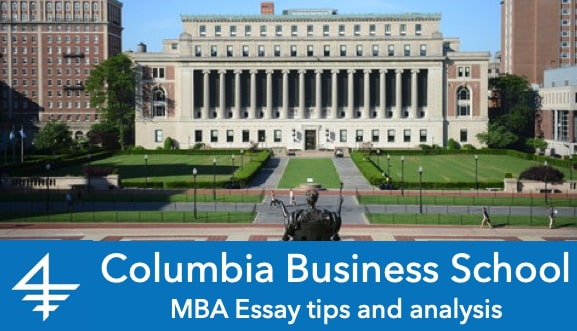
Columbia business school, at the very center of business , has retained all the essays, including the short answer question, Essay no. 1 (career goals), and Essay no. 2 (fit) for the application cycle 2022-23. Like previous years, CBS allows applicants to submit an optional essay to explain any areas of concern in their application.

In this article, Poonam Tandon from myEssayReview, who has been helping students with their MBA applications since 2011, shares her tips on the Columbia MBA essays for the 2023 intake.
But before discussing individual essays, let’s take a look at Columbia MBA deadlines for the 2023 admissions.
Columbia MBA Application Deadlines
- Early Decision/January Deadline: September 28, 2022
- Merit-Based Fellowship Deadline: January 11, 2023
- Final Regular Decision Deadline: April 5, 2023
- Deferred Enrollment Deadline: April 15, 2023
Columbia MBA Essays
Here is Poonam’s analysis of Columbia Business School essay topics for 2023 intake:
Short Answer Question
What is your immediate post-MBA professional goal? (50 characters maximum)
This is a straightforward question about the candidates’ career goal immediately after graduating from Columbia Business School. In a mere 50 characters, including space (approximately eight words), you have to mention the job you wish to have after completing MBA. Please make sure that your post-MBA goal aligns with your long-term goal that you will discuss in essay #1. Since the character limit is so stringent, you may not stress yourself writing complete sentences.
Please reveal your true goals, and not what CBS wants to hear I would encourage you to look at CBS’ examples of possible responses :
Examples of possible responses:
- “Work in business development for a media company.”
- “Join a strategy consulting firm.”
- “Launch a data-management start-up.”
Let’s take a closer look at other essays now.
Columbia MBA Essay 1
Essay #1: through your resume and recommendations, we have a clear sense of your professional path to date. what are your career goals over the next 3-5 years, and what, in your imagination, would be your long-term dream job (500 words).
CBS is going with this prompt again this year and begins this essay prompt by clearly stating not to repeat the information already given in resume and recommendations. In other words, the Admission Committee is shoving you away from wasting their time in repeating your résumé!
Though the question asks only about short-term and long-term goals, a bit of context about professional history is required to explain what has led you to your career goals. Now, if you must mention some of your achievements, it should be done only to carry your career path forward.
You may build your essay from the immediate post-MBA goal already stated in the short answer question. Talk about your career goals over the next 3-5 years, sharing how you intend to progress from your short-term goals to the long-term dream job.
Also, make sure to keep the short- and long-term goals aligned. Notice the phrases in the essay question “dream job” and “in your imagination;” CBS is urging you to be creative, imaginative, and think big, and is interested to know your dream job- your long-term goals. You may not need to conform to prescribed norms; you could be the one who may pave the way for others.
You may tend to get a bit too carried away with “dream job.” But you should resist the temptation and be as realistic and grounded as possible while detailing out your goals.
Try to highlight how things may change for the community or people around you when you succeed in getting your dream job. Your plans could be ambitious, but they should be viable and realistic. So, you should also stress your ability to fulfill your dream.
Although CBS does not ask how MBA from CBS will help you reach your goals, we believe that you can wrap up the essay with a comment on (only one sentence) how CBS will open the doors to your dream career path. You don’t want to go into details since you will talk about CBS in detail in the second question.
Columbia MBA Essay 2
Essay #2: why do you feel columbia business school is a good fit for you academically, culturally and professionally (300 words).
Essay #2 picks up from where Essay #1 left off. After detailing out your career aspirations, you will now explain how CBS is aligned with your goals.
The best way to write an effective response is to do thorough research of Columbia’s intellectually driven alumni from varied backgrounds, curriculum, experienced faculty, clubs, extracurricular activities, strategic location, and recruiting strengths.
And then, discuss how you intend to use the resources and offerings of the CBS MBA program to reach your short-term and long-term goals already mentioned in the short answer question and essay #1.
It is a good idea to highlight strengths listed on the CBS website , “Only Columbia Business School gives you the opportunity to shape your career in the very center of business. There’s something about being positioned in New York City, where access to leaders across the industry is truly advantageous. Here you will learn to take on challenges and respond dynamically. You’ll gain skills to succeed in fast-moving, competitive environments anywhere. Hone your strengths. Find your best career path. Realize success.”
CBS takes great pride in its strategic location, i.e., New York. So you should put across your plan to make the best use of CBS being at “the very center of business.” Having access to the leaders across the world is emphasized by CBS as it is one of the key benefits of the program.
You may indicate how you can make use of CBS’s close ties to the business, non-profit, and government communities to succeed in the fast-moving competitive environment.
Make a list of the opportunities you hope to get at CBS and in New York City, and then link each of these to your goals. Reviewing CBS’s website, conversing with the alumni, attending CBS events for prospective students, and visiting campus (if possible) could all work to your advantage by setting your case apart.
Writing an impactful essay, highlighting how the strategic location and resources at CBS can be an excellent choice for accomplishing your short-term and long-term goals in only 300 words is not an easy task.
To meet the stringent word limits, you need to be extremely precise in presenting your case and make every word count.
Columbia MBA Essay 3
Essay #3: tell us about your favorite book, movie, or song and why it resonates with you. (250 words).
This question is brand new for 2020-21, replacing last year’s question about a leader you admire. This essay prompt is an opportunity to offer the Ad Com a peek into your personal side- your values, beliefs, interests, and experiences.
The main focus of this 250 -words essay should not be on the book, movie, or song but on your reasons for loving that. It does not matter whether you choose a movie, a song, or book or which movie, song, or book you choose. The key here is why that piece resonates with you. Here, the “why” becomes more important than the “what.”
You may begin by providing some background information about the theme of the book, movie, or song you have chosen (approximately 60-70 words) and then go on to explain why that piece is so meaningful to you that it became your favorite.
By describing why the piece resonates with you, you are sharing your emotions, feelings, values, fears, and dreams, which in turn reveal the personality traits that make you who you are. And please do not quote from other people’s critiques or views. Be original and authentic. Do not write anything that you think the Ad Com will ‘like’ to hear; instead, be candid in sharing your thoughts and views.
Optional Essay
If you wish to provide further information or additional context around your application to the Admissions Committee, please upload a brief explanation of any areas of concern in your academic record or personal history. This does not need to be a formal essay. You may submit bullet points. (Maximum 500 Words)
An optional essay is an opportunity for you to share relevant information with the Ad Com that you could not provide in other parts of your application, essays, and resume. The optional Essay is meant to address any weakness in your profile.
For example, if you have a lower than average GMAT score, any grades below a C on your transcript, academic probation, or a significant employment/education gap, you can explain that in this essay.
Also, if you cannot get your recommendation letter from your current supervisor, you should explain that in the optional essay. Your response should be positive, straightforward, and fact-focused and should not sound like you are making excuses for a weakness in your profile.
To provide a context for a weakness in your profile, make sure your reason is genuine to convince the Ad Com that your low grades or employment gap occurred due to unforeseen circumstances beyond your control. First, explain the facts, then show how you have addressed the issue, and finally, conclude by explaining why this will not impact your ability to handle the academic rigor of the program.
This question is entirely optional. If you don’t have any area of concern, you may not write this essay.
Free Resources
- 10 Key Essay Tips with Examples
- Essay Analysis of Other Top Programs-2022-23
- MER Students Share their success Stories
- Case Studies
Since 2011, MER ( myEssayReview ) has helped many applicants get accepted into the top 20 MBA programs, including CBS. (Poonam is one of the top 5 most reviewed consultants on the GMAT Club .)
Do you have questions about your application? E-mail Poonam at [email protected] or sign up here for a free consultation.
About the author

Poonam, one of the top 5 most reviewed consultants on the GMAT Club , is a master storyteller with more than three decades of experience in successfully helping students craft compelling stories for undergraduate and graduate school programs.
A Ph.D. in English, with three decades of teaching experience in India and the US, Poonam launched myEssayReview (MER) in 2011 to provide highly personalized and dedicated consulting services to Business School applicants. Since then, she has helped hundreds of students around the world get into top MBA, EMBA, part-time MBA, and specialized graduate programs. A full-time consultant, Poonam is passionate about her work and is highly committed to each of her students’ success.
Aspire to get into the Columbia’s MBA Program? A 740+ GMAT score can greaty improve yur chances of an admit as well as a scholarship. Kickstart your GMAT preparation by Signing up for our Free Trial ! For any queries, write to us at [email protected] . We are the most reviewed GMAT prep company on gmatclub with more than 2500 reviews.
About The Author

Suheb Hussain
Don't miss these.
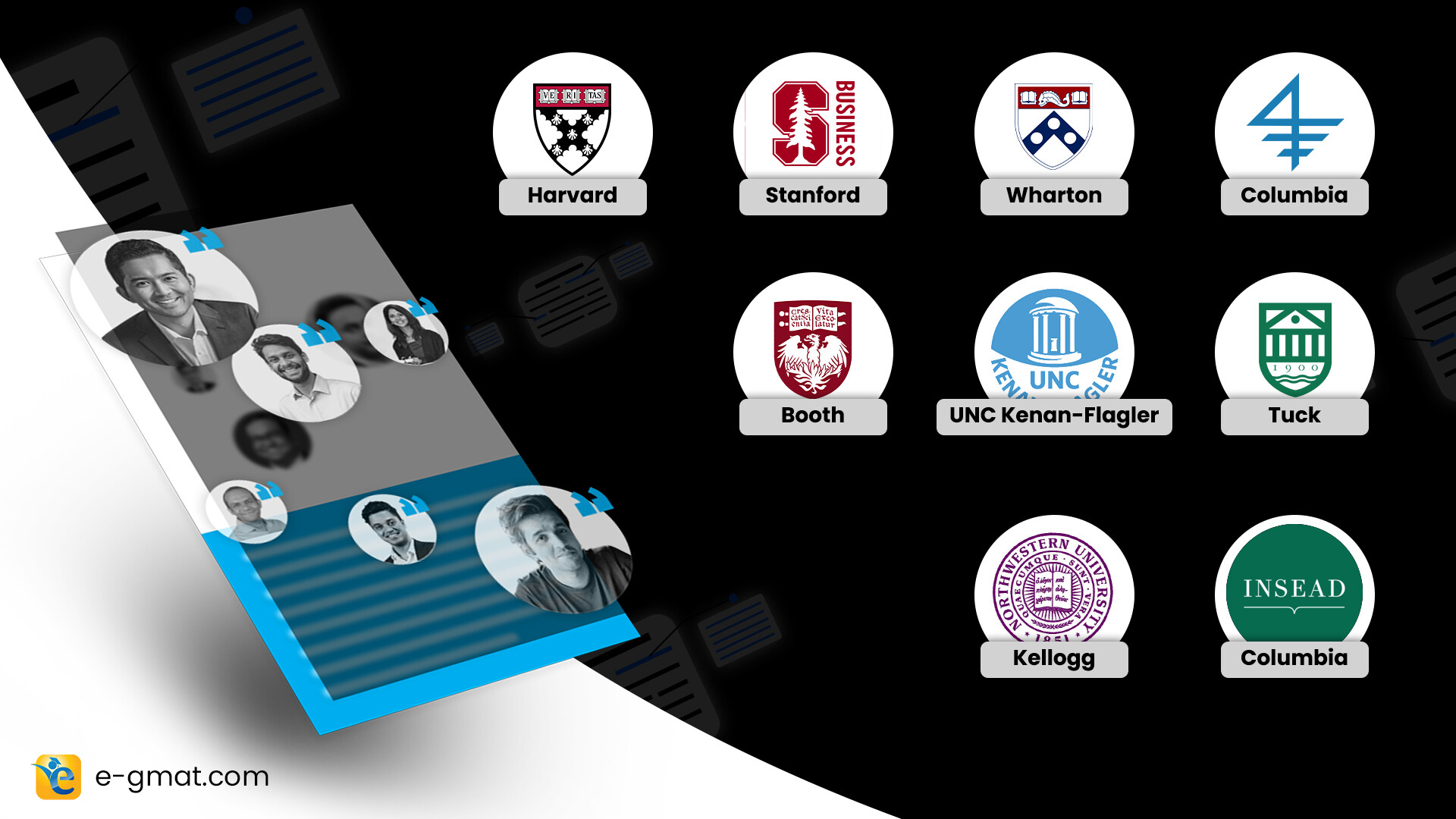
Helpful posts Curated just for you!

You might also like
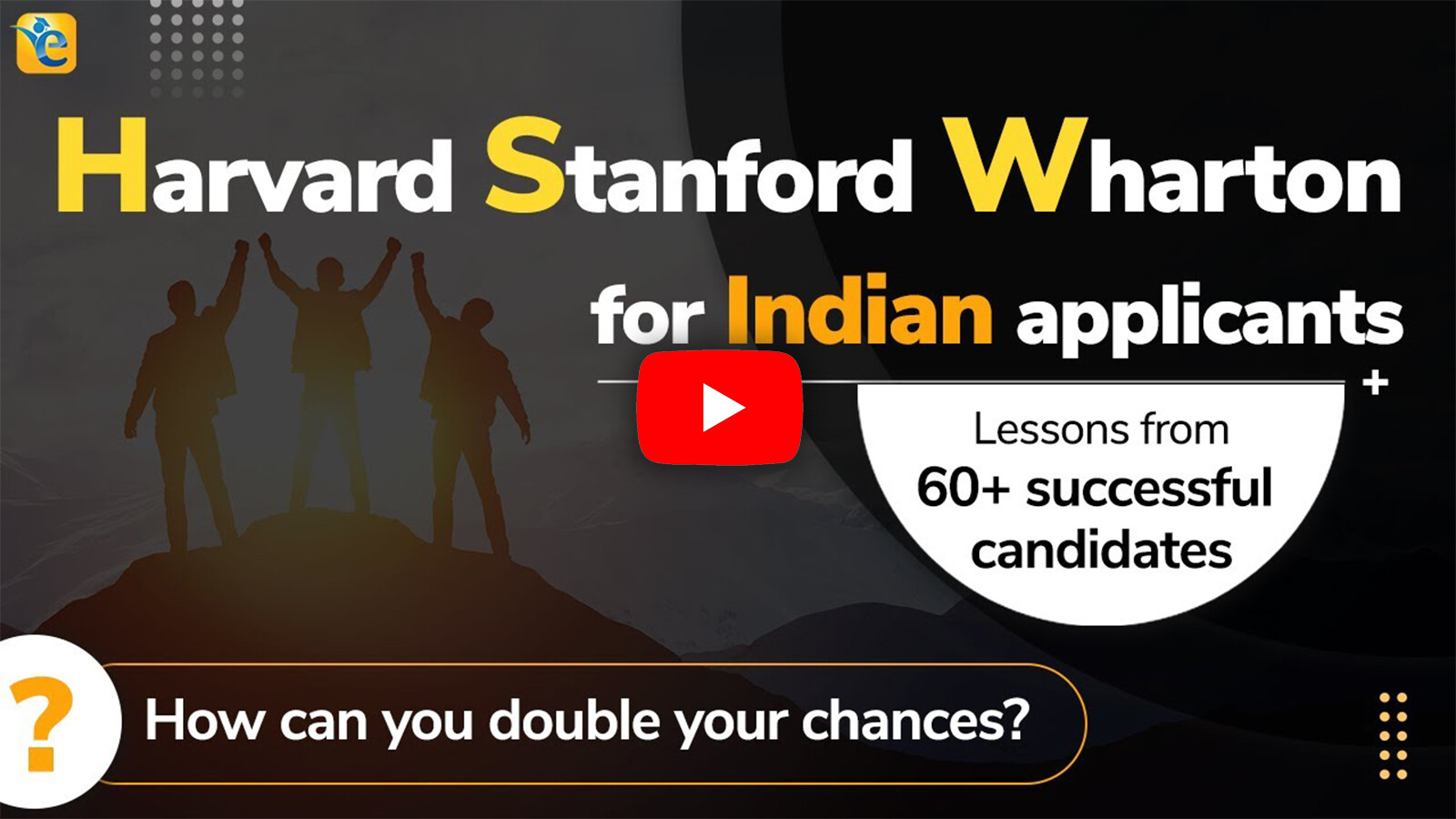
Browse Related Topics

Take a free diagnostic SIGma-X mock test
Gauge your section-wise ability and get started with your gmat prep.
Adaptive mock test with ESR+ analysis
400+ practice questions with detailed solutions, 10+ hours of ai-driven video lessons.
Take the first step to score 740+

Columbia • Essay • MBA
Columbia Business School MBA 2021-2022 Essay Tips
October 7, 2021

While the MBA deadlines for Columbia Business School have remained rather consistent from the last admissions cycle to this one, the essays have undergone a partial makeover: For the second and third essays, you are now asked to respond to 2 questions from a list of 3 options.
Before you tackle this part of the CBS application, be sure to put time and effort into researching the university. Read everything you can about Columbia’s MBA, the university and its NYC location. Join webinars, attend events and, if possible, visit the campus. Once you’ve done all that, reach out to alumni about their experiences and network around. All of this information gathering will greatly improve the quality of your essays and your contact with CBS’ admissions team.
Short Answer Question: What is your immediate post-MBA professional goal? (50 characters maximum)
Examples of possible responses:
“Work in business development for a media company.”
“Join a strategy consulting firm.”
“Launch a data-management start-up.”
While you can’t write an essay here, you’re still expected to sell your future career in 50 characters or less. That’s a tall order! Keep in mind that Columbia is requesting your immediate post-MBA goal, implying that the objective has to be—based on your professional experiences and future education—feasible. Don’t worry, you’ll have a chance in the other essays to discuss your long-term career objectives more fully.
Most applicants generally have more than one potential post-MBA goal. If you fall into that group and are unsure of which to mention, try to the pick the one that’s most likely to manifest itself. If your objective is too generic, try identifying what sort of specificity you could add to it to make it more a tangible goal.
Essay 1: Through your resume and recommendations, we have a clear sense of your professional path to date. What are your career goals over the next 3-5 years and what, in your imagination, would be your long-term dream job? (500 words)
Columbia offers a dynamic MBA and is looking for competitive, innovative candidates. What they’re trying to gauge in this question is both your sensibility (are you aware of what your skills and profile are likely to lead to in 3-5 years?) and your desire for achievement (what is the potential value and impact of your “long-term dream?”).
As you’re selecting your goals, try to remember that you should ideally present a continuum from your past to near-future experiences. That doesn’t mean that you can’t dream big (CBS is filled with some of the most creative and daring minds), but rather that you should illustrate how the skills you’ve already started developing can make your big dream become a reality.
In order to enhance your arguments, it can be good to cite relevant examples from your life that clearly benefit your future objectives. However, it’s best if those instances are not repeated in other parts of your application and are not overly long.
Essays 2 and 3: Please respond to two (2) of the three (3) essay questions listed below:
- The Phillips Pathway for Inclusive Leadership (PPIL) is a new co-curricular program designed to ensure that every CBS student develops the skills to become an ethical and inclusive leader. Through PPIL, students attend programming focused on five essential diversity, equity, and inclusion skills: Creating an Inclusive Environment, Mitigating Bias, Communicating Across Identities, Addressing Systemic Inequity, and Managing Difficult Conversations. Tell us about a time you were challenged around one of these five skills. Describe the situation, the actions you took, and the outcome. (250 words)
- Why do you feel Columbia Business School is a good fit for you? (250 words)
- Tell us about your favorite book, movie, or song and why it resonates with you. (250 words)
Below, we’ll walk you through how to approach each of these three choices.
Choice 1: The Phillips Pathway for Inclusive Leadership (PPIL) is a new co-curricular program designed to ensure that every CBS student develops the skills to become an ethical and inclusive leader. Through PPIL, students attend programming focused on five essential diversity, equity, and inclusion skills: Creating an Inclusive Environment, Mitigating Bias, Communicating Across Identities, Addressing Systemic Inequity, and Managing Difficult Conversations. Tell us about a time you were challenged around one of these five skills. Describe the situation, the actions you took, and the outcome. (250 words)
This essay choice is the only truly new part of CBS’ admissions questions, and as such present a new opportunity for applicants to highlight both ethical leadership and strong problem-solving skills.
For this choice, begin by brainstorming various situations in which you recall being challenged and successfully taking steps to overcome the situation. Once you’ve put time into recalling these options, see which one best fits one of the 5 skills listed and paints a positive picture of your problem-solving skills. Perhaps a past client underestimated a fellow employee based on their identity, and you stepped up to defend your peer’s skills. Perhaps you noticed micro-aggressions occurring at your office, and so you initiated a conversation around how to create a more inclusive work culture. If you work for an NGO, it may not be too hard to find a good example of your work directly addressing inequity. However, all work environments run into issues concerning bias, how to handle difficult conversations, and how to address systemic inequalities — and that’s precisely what CBS wants to see that you’re aware of and ready to discuss.
Choice 2: Why do you feel Columbia Business School is a good fit for you? (250 words)
If you’ve done your research, there might be a lot of factors influencing your choice to apply to CBS. However, with only 250 words at your disposal, you’ll need to be very direct in highlighting what benefits CBS will bring to you.
There are various ways to approach the essay, but one of the most practical and positive ones is by working backward from your post-MBA objectives: What will you need to achieve your goals? Is there knowledge, particular skills, or network connections that you’re currently lacking? Is access to the NYC market important for you? There are many questions that can be relevant to ask yourself, so be sure to dig deep as you try to identify what’s necessary to accomplish your post-degree goals.
Once you have a series of requirements listed, you’ll need to match them with what Columbia University can offer you. This is the moment where your initial research, school visits, and alumni outreach should pay off. By now, you should have a powerful understanding of CBS’ program structure, the courses offered, its professors, alumni network, company links, student organizations, and much, much more. Once you’ve connected those resources to your future needs, you should narrow it down to those that are the most crucial and impactful to mention.
Choice 3: Tell us about your favorite book, movie or song and why it resonates with you. (250 words)
At first sight, questions like this can throw applicants off because they seem so far from anything to do with business. However, they get at an important part of the admissions process: fit. Columbia is trying to see if you come across as an MBA/CBS type of storyteller. In other words, can you charmingly engage the reader about your interests?
Before you jump into the essay, start by making a list of books, movies and songs that you’re passionate about or that have actually impacted your life. Don’t worry about including elements that are popular or cheesy—while uniqueness might be ideal, the vital part of the question isn’t what you choose but why . Once you’ve got your list, select an element that has changed or aided you somehow, or, even better, helped you have a positive effect on others. That way, for instance, when you’re talking about your favorite pop song, you’ll be able to weave in a story of motivating your team to surpass their limits with it.
Optional Essay: If you wish to provide further information or additional context around your application to the Admissions Committee, please upload a brief explanation of any areas of concern in your academic record or personal history. This does not need to be a formal essay. You may submit bullet points. (Maximum 500 Words)
This space should only be used to explain away any irregularities to the admissions committee. If you do have any particular profile issues (lack of a direct supervisor recommendation, poor university grades, gaps in job experience, etc.), it’s generally to your benefit to keep this answer short. But don’t leave this space blank if you believe something in your profile comes across negatively. If you don’t address it here, CBS’ admissions will likely assume the worst cause was the reason.
When dealing with something that is or appears to be problematic, a good approach can be to illustrate how you’ve completely resolved the issue. If you received poor grades during your university studies, for example, explaining to Columbia Business School how you’ve since taken university-level courses that you’ve excelled at is a strong argument for having permanently resolved the problem.
To get into the MBA program at Columbia, you’ll need a strong strategy to back you up, so be sure to take advantage of the opportunity to connect with our CBS experts . Also, if you’re searching for more information on the technical requirements of the application, you can visit CBS’ official site .
Related Posts

5 Things You Should Do Before Applications Open

Planning for Round 2

CEIBS MBA 2022-2023 Essay and Video Tips

Carnegie Mellon Tepper School MBA 2022-2023 Essay & Video Tips

© 2022 • Admission Circle • Designed by Theme_Master
Privacy Overview
You are using an outdated browser. Please upgrade to one of the supported browsers listed below to improve your experience and security.
- Microsoft Edge (last 2 versions)
- Mozilla FireFox (last 2 versions)
- Google Chrome, including Android (last 2 versions)
- Apple Safari, including iOS (last 2 versions)

Business is evolving fast. Stay one step ahead.
The Columbia MBA prepares you today to lead in the rapidly changing business world of tomorrow. Our comprehensive and forward-looking curriculum builds the foundation for success in all fields while offering deep insights into specific industries.
With unmatched access to business as it unfolds, plus a vital community of diverse thinkers, graduates leave here informed, adaptive, and ready to solve real-world business challenges with innovative solutions.
The Columbia Advantage
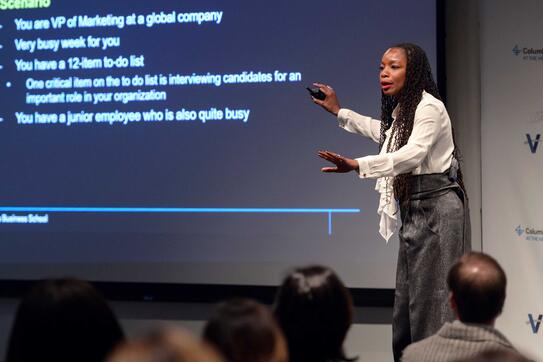
Enroll at Columbia Business School and experience the power of knowledge. Our 150 full-time faculty are transforming business strategies across the globe. Joining them are more than 20 Executives in Residence and over 100 adjunct faculty practitioners who come from leading corporations to share their wealth of experience. Informed in real time by the quickly shifting business landscape, they teach a transformative and ever-evolving curriculum that empowers graduates to create opportunities in any industry.
Theory Meets Practice
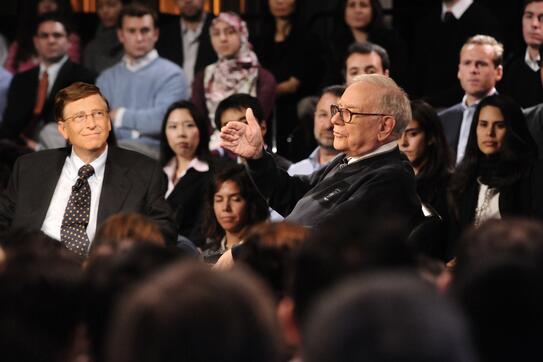
No other top MBA program offers our level of real-world exposure. At Columbia Business School, we immerse students in business by connecting their classroom education to the board rooms, trading floors, and retail stores where theory is put into practice. Through top-tier internship and externship programs, students apply their learnings to help an array of companies with finance, investing, marketing, data analytics, and product development.
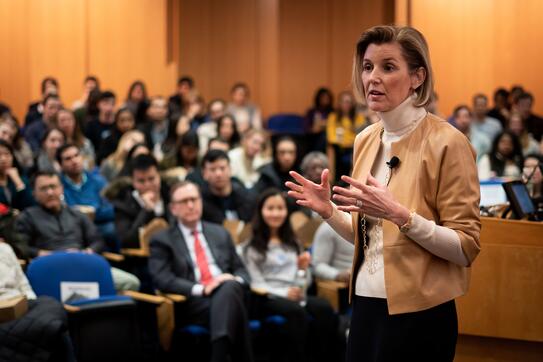
Rooted in New York City, students have unmatched access to top leaders of industry — in the classroom, throughout the city, and around the globe. Be inspired by guest lecturers, a multitude of speakers, and our Executives in Residence program as we bring immediately applicable insights to campus daily.
In fact, more business leaders visit our campus than any other top-tier business school. And with a highly-engaged global alumni network of 48,000+ strong, you’re never far from a Columbia Business School connection.

Take one look around our campus and you’ll see the world reflected in our culture and the content of our work. Students come to Columbia Business School from 90 countries, and bring with them every kind of business perspective.
Whether you arrive from across the globe or on a crosstown bus, your student experience will be defined by much more than coursework. Take part in campus traditions, community service, and student organizations that reflect a full spectrum of backgrounds and interests. Here, you'll find a remarkably tight-knit, supportive community to help you succeed.
Career Resources

Our Career Management Center (CMC) is here to help you learn the building blocks of career management — preparing you not only for your first job after graduation, but for a lifetime of success in the private, public, and nonprofit sectors.
Find support from a range of CMC resources to aid your search for internships and full-time employment. By taking advantage of one-on-one sessions with your advisors and formulating individual job-search strategies — as well as garnering tactical advice from workshops and events — you'll be well-prepared to navigate the job-search process.
Executives in Residence

The Executives in Residence Program comprises 26 senior executives from the C-Suite of companies in industry verticals such as technology, retail, health care, manufacturing, and consumer goods, as well as senior partners from strategy consulting, private equity, financial services, and real estate. Columbia's EIR program is unique among the top-tier MBA programs because of the scope of our executives' involvement at the school.
Diversity, Equity, & Inclusion

Every business and community is stronger when we include diverse voices. That's why Columbia Business School is committed to promoting diversity in all its forms by making sure those from all racial, ethnic, socioeconomic, and professional backgrounds feel welcomed and represented in our community.
The School's Diversity, Equity, and Inclusion (DEI) Initiative, led by the Vice Dean of DEI, monitors and makes recommendations pertaining to the Initiative's three pillars of Community Diversity, Curriculum and Classroom Inclusion, and Culture and Climate. Meanwhile, a Standing Committee — comprising students, faculty, and staff — creates relevant campus and community programming.
Our Manhattanville Home
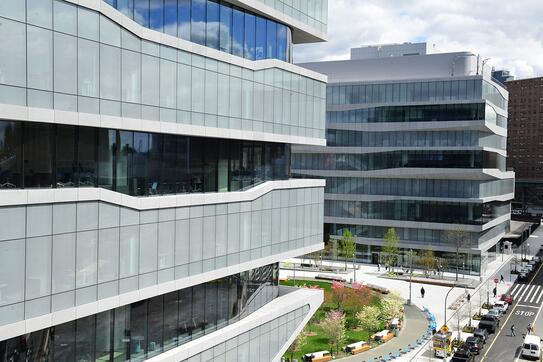
After proudly calling Uris Hall home for more than half a century, we’re excited to embark on a whole new era. We recently moved to our new home on our Manhattanville campus. Filled with light, leading technology, and open spaces that promote innovation and connection, our new facilities are a center for groundbreaking research, world-class education, and interdisciplinary collaboration.
By the numbers
- Stay In Touch
Accessibility Panel
Language settings, css cheat broken widths with carousels.
- GMAT CLUB TESTS
- FORUM QUIZ - NEW!
- QUESTION BANKS
- DECISION TRACKER
- SCHOOL DISCUSSIONS
- MARKETPLACE
- T&C and Privacy Policy
- GMAT Club Rules
- Login Register Forgot password?
- ${glob_var/L_LOGIN_LOGOUT}
- Quick Search
Columbia MBA Essays for 2022-2023
Short Answer Question
What is your immediate post-MBA professional goal? ( maximum 50 characters )
Examples of possible responses:
- “Work in business development for a media company.”
- “Join a strategy consulting firm.”
- “Launch a data management start-up.”
Through your resume and recommendations, we have a clear sense of your professional path to date. What are your career goals over the next three to five years and what is your long-term dream job? ( 500 words )
We believe Columbia Business School is a special place. CBS proudly fosters a collaborative learning environment through curricular experiences like our clusters and learning teams , co-curricular initiatives like the Phillips Pathway for Inclusive Leadership , which aims to equip students with the skills and strategies necessary to lead in an inclusive and ethical manner, and career mentorship opportunities like our Executives-in-Residence program .
Why do you feel Columbia Business School is a good fit for you academically, culturally, and professionally? ( 300 words )
Tell us about your favorite book, movie, or song and why it resonates with you. ( 250 words )
Optional Essay
If you wish to provide further information or additional context around your application to the Admissions Committee, please upload a brief explanation of any areas of concern in your academic record or personal history. This does not need to be a formal essay. You may submit bullet points. ( Maximum 500 Words )
Deferred Enrollment Program
Deferred Enrollment candidates will answer two short essay questions instead of the essays listed above.
Why are you interested in obtaining a Columbia MBA in the future? ( 300 words maximum )
Who is a leader you admire, and why? ( 300 words maximum )
For more information on applying, please visit the Columbia Business School admissions website. If you need guidance on your Columbia MBA essays or wish to discuss your MBA plans, reach out for a complimentary analysis of your candidacy. We’re here to help!
The post Columbia MBA Essays for 2022-2023 appeared first on Stacy Blackman Consulting - MBA Admissions Consulting .
stacyblackman
Stacy Blackman Consulting is the only MBA admissions firm with a complete panel of former Admissions Officers from every M7 program and the elite European MBA programs. If you are looking for guidance on your MBA application, we can help with hourly and comprehensive consulting services. Contact us to learn more.
Published in MBA , Stacy Blackman Consulting , Admission Consultants and Blog

MBA Resources
CBS Essays : Sample Essays & Essay Writing Tips

MBA & Beyond Team
22/12/2023 | 10:39 pm

If you’re a student looking to study abroad, specifically aiming for a coveted spot in the Columbia Business School (CBS) MBA program, you’re in the right place. Today, we’re diving into the heart of the CBS application process – the essays. These aren’t just any essays; they are a window into your aspirations, capabilities, and fit for one of the world’s most prestigious business schools.
The essays for the CBS MBA program are a critical component of your application. They offer you a unique opportunity to present yourself beyond grades and test scores. In this guide, we’ll walk through each essay prompt, providing insights and tips to help you craft compelling narratives that resonate with the admissions committee.
Why Focus on Essays?
Columbia Business School, located in the epicenter of business – New York City, seeks candidates who not only have clear career goals but also bring diverse perspectives and leadership potential. Your essays are the perfect platform to showcase these qualities. They are more than just written responses; they represent your ambition, personality, and vision.
UNDERSTANDING CBS’S APPROACH
At CBS, the emphasis is on understanding your career trajectory, your leadership experiences, and your reasons for choosing CBS. As you write, remember that every word counts. The admissions committee at CBS looks for clarity of thought, depth of insight, and the ability to communicate effectively.
Now, let’s embark on this journey to make your CBS MBA essays stand out!
ESSAY ANALYSIS AND STRATEGIES
Essay 1: career goals and long-term aspirations, understanding the prompt.
In this essay, CBS wants to delve into your career goals over the next 3-5 years and your long-term dream job. But there’s a twist – they’re interested in your future, not your past.
Key Points to Cover:
- Medium and Long-term Goals: Outline your career objectives post-MBA, focusing on the 3-5 year timeframe. It’s important to connect these goals to your first post-MBA job, offering a clear trajectory of how you envision your career unfolding.
- Feasibility and Aspiration: While CBS encourages you to dream big, ensure your goals are grounded in reality. Showcase how your aspirations align with your experiences and the skills you aim to gain from an MBA at CBS .
WRITING TIPS:
- Be Specific: Vague goals don’t cut it. Be as specific as possible about the industry, role, and the kind of impact you want to make.
- Connect the Dots: Demonstrate how your past experiences, CBS’s MBA program, and your future aspirations are interconnected.
ESSAY 2: INCLUSIVE LEADERSHIP AND THE PPIL INITIATIVE
Decoding the prompt.
This essay revolves around the Phillips Pathway for Inclusive Leadership (PPIL), a unique aspect of the CBS curriculum. You’re asked to describe a situation where you utilized inclusive leadership skills.
Key Components to Address:
- Understanding PPIL: Before diving into writing, familiarize yourself with the PPIL initiative and its five inclusive leadership skills: Mitigating Bias and Prejudice, Managing Intercultural Dialogue, Addressing Systemic Inequity, Understanding Identity and Perspective Taking, and Creating an Inclusive Environment.
- Personal Experience: Reflect on a situation where you demonstrated one or more of these skills. It could be in a professional setting, a community project, or any other relevant context.
CRAFTING YOUR RESPONSE:
- Storytelling Framework: Use a clear storytelling framework, such as the SOAR model (Situation, Obstacle, Action, Result), to structure your response.
- Depth Over Breadth: Given the word limit, it’s better to go deep into one or two skills rather than trying to cover all five. Describe the situation, the actions you took, the outcome, and, importantly, your learning from the experience.
III. ESSAY 3: WHY CBS?
Unpacking the prompt.
In this essay, Columbia Business School invites you to articulate why it’s the ideal place for your MBA journey. This question is more than just academic; it’s about fit – culturally, academically, and professionally.
Key Aspects to Focus On:
- Academic Fit: Dive deep into CBS’s curriculum. Highlight specific courses, professors, and unique programs that align with your career goals. For example, if you’re interested in finance, you might mention CBS’s renowned finance faculty and its location in the financial capital of the world.
- Cultural Fit: Reflect on CBS’s community culture. Mention clubs, events, and other aspects of student life that resonate with your personality and interests. This is where your personal story comes into play – how you see yourself contributing to and benefiting from the CBS community.
- Professional Fit: Emphasize how CBS’s network, career services, and other resources like the Executives-in-Residence program align with your professional aspirations. Don’t forget to mention the strategic advantage of being in New York City and how you plan to leverage this for your career.
WRITING STRATEGY:
- Be Specific and Research-Driven : Generalities won’t work here. Back up your fit with CBS through detailed research. Mention specific elements of the program and how they align with your goals.
- Personal Narrative : Connect your background, experiences, and aspirations to what CBS offers. This is not just about what CBS can do for you, but also what you can bring to CBS.
OPTIONAL ESSAY: ADDRESSING CONCERNS
This optional essay is your chance to address any potential red flags in your application (like gaps in employment or lower than average test scores).
Want to pursue an MBA but not sure if your profile fits?
Talk to our Profile Experts to know your chances for a top MBA Program.
Key Points to Remember:
- Use Only If Necessary : This essay should be used to address specific concerns in your profile. If there’s nothing significant to explain, it’s better not to write this essay.
- Be Concise and Direct : If you do write this essay, be straightforward. Provide a clear explanation, focus on the facts, and if applicable, mention any steps you’ve taken to address these issues.
- Contextualize : Briefly explain the situation. Whether it was a gap in your education or a low GPA in a particular semester, provide context.
- Positive Spin : Focus on how you’ve overcome these challenges or what you’ve learned from them.
- Future Outlook : Assure the admissions committee that these issues won’t hinder your success in the MBA program.
WRITING TIPS FOR CRAFTING COMPELLING CBS ESSAYS
Now that we’ve delved into the specific essays, let’s focus on some general tips to elevate your writing and make your application to CBS stand out.
UNDERSTANDING THE CORE CONCEPTS
Before you start writing, ensure you have a firm grasp of the key concepts CBS values, like diversity, equity, and inclusion. These aren’t just buzzwords; they’re pillars of the CBS community. Understanding these concepts will not only help you write better essays but also show the admissions committee that you align with their values.
STRUCTURING YOUR CBS ESSAYS
The structure of your essays can make a significant difference. A well-organized essay with a clear narrative makes it easier for the admissions committee to follow your thoughts and understand your story.
- Use a Storytelling Framework: Employ frameworks like the SOAR model (Situation, Obstacle, Action, Result) to structure your responses, especially for behavioral essays like the PPIL essay.
- Clarity and Coherence: Ensure each paragraph transitions smoothly to the next, and each CBS essays builds upon the previous one to create a cohesive picture of your candidacy.
HIGHLIGHTING PERSONAL EXPERIENCES AND VALUES
Personal experiences and values are what differentiate you from other candidates. When discussing personal experiences:
- Be Authentic: Share genuine stories that reflect your personality, values, and motivations.
- Reflect on Learnings: Don’t just describe what happened; reflect on what you learned from the experience and how it shaped your perspective.
LEVERAGING CBS’S LOCATION AND OPPORTUNITIES
CBS’s location in New York City is a unique aspect of its MBA program. When writing about why CBS is the right fit for you:
- Highlight New York City: Discuss how being in the heart of the business world will benefit your career and how you plan to take advantage of the city’s resources.
- Connect with CBS’s Network: Mention how you plan to engage with CBS’s vast network of alumni, industry leaders, and professionals.
Writing your CBS essays can be a daunting task, but it’s also an exciting opportunity to showcase your strengths, aspirations, and fit for the program. Remember, your essays are a critical part of your application and can be the deciding factor in your admission. So, take your time, reflect deeply, and write authentically. Start early, and don’t hesitate to seek feedback .
CBS is looking for leaders who are not only academically capable but also bring diverse perspectives and experiences to the table. Through your essays, you have the chance to prove that you are one of these leaders.
Leave a Reply
Your email address will not be published. Required fields are marked *
Articles You Might Like

Should an International Candidate go for an INSEAD R3 MBA?

Top MBA programs starting in January 2025
Upcoming Events
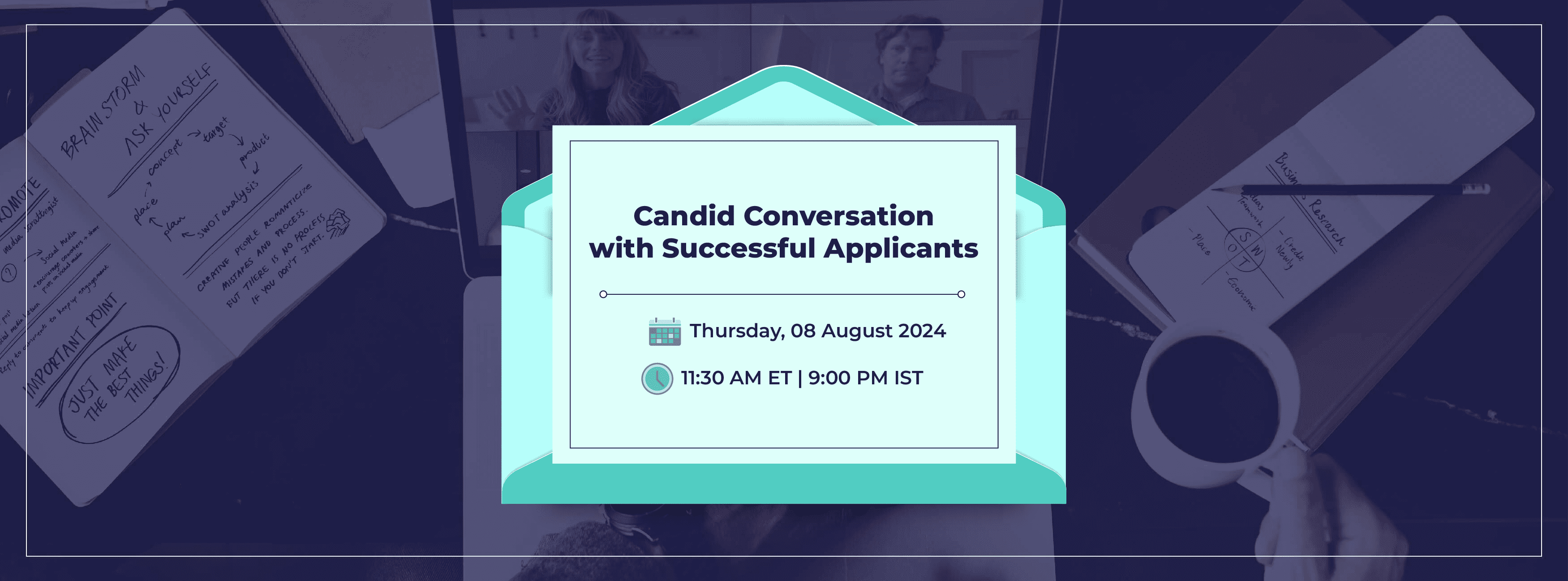
Candid Conversation with Successful Applicants
August 8, 2024 | 9:00 pm – 10:00 pm
UPCOMING EVENT: Candid Conversation with Successful Applicants. Register now
Which program are you applying to?

Accepted Admissions Blog
Everything you need to know to get Accepted

July 28, 2022
Columbia EMBA Application Essay Tips & Deadlines [2022 – 2023]

The first two Columbia EMBA essay questions ask you to project into the future, both near and long term – they address what you hope, plan, want, expect – and dream. The third essay question is a “getting to know you” question, it reflects the adcom’s interest in your well-roundedness.
In these essays, a potential pitfall, given the non-anecdotal questions, is to write generically, abstractly: ideas, thoughts, buzz words, admirable ideals/objectives, artistic critiques. However, even though not specified in the questions, grounding these essays in your experience – through anecdote and example – is the key to making them memorable and dynamic.
This approach will result in a vivid, distinctive, meaningful picture of your candidacy. Considering the scant opportunity to discuss past professional achievements in the essays, your resume carries all the more weight in the Columbia EMBA application – attend to it accordingly.
Columbia Executive MBA short-answer question
What is your immediate post-MBA professional goal? (50 characters maximum) Examples of possible responses: 1) “Work in business development for a media company.” 2) “Continue my career within investor relations.” 3) “Launch a data-management start-up.”
As their examples show, a factual phrase or bullet will suffice; no need to use a whole sentence. Include key details with function and industry being the essential elements.
Columbia Executive MBA essay questions
Columbia emba essay #1.
Through your resume and recommendations, we have a clear sense of your professional path to date. What are your career goals over the next 3-5 years, and what, in your imagination, would be your long-term dream job? (500 words)
This question helps you avoid a common, reflexive pitfall: summarizing your career before discussing goals. Yes, goals need a context – and a sentence (or two) upfront about your current situation can work as a launchpad for presenting your goals. CBS is always interested in your plans for achieving your goals as well as the goals themselves – a practical focus. In this case it’s asking you to specify your short-term goals (3-5 years). So, detail the role(s) you anticipate during these years: position, type of company, scope of accountability, what you want to accomplish, and why you want to pursue this path – this “why” will allow the readers to get excited about your goals.
Your longer-term “dream job” needs less detail and should of course reflect some reasonable trajectory from the earlier role. The phrase “dream job” instead of “long-term goal” plus “in your imagination” invites (even encourages) you to be open, to take a bit of a risk, show some heart. If it’s a dream job, it should be ambitious in a way that is meaningful and enticing to you. Make the reader feel your excitement.
There is no request to explain “why Columbia” in the question, but it would be fine to add a sentence or two about what is truly compelling to you about the program, if you have something thoughtful and insightful to say in this regard.
Columbia EMBA essay #2
Columbia Business School’s Executive MBA will challenge you by offering a rigorous academic experience, global exposure through the international seminar, and the opportunity to immediately apply what you learn to your career. How will you approach balancing the demands of the program with your professional and personal life while you are in school? (250 words)
Keep this essay concrete and practical. Discuss the accommodations you will make at work, such as delegating more, adjusting travel schedules, etc. Focus on the most significant two or three adjustments.
Also address how you will handle your personal responsibilities with this additional demand on your time and energy; include 1-2 specific changes (probably, sacrifices), e.g. acknowledging that you’ll have less time at the playground with your toddler or mentioning the support of your significant other.
If you’ve already successfully balanced school and working full time, describe how you did it. Nothing is better than actual evidence that you can juggle these concurrent demands.
Columbia EMBA essay #3
Tell us about your favorite book, movie or song and why it resonates with you. (250 words)
Columbia EMBA’s adcom wants to get to know you as a person, beyond all the professional success, career plans, and extracurricular initiatives. What better way than with this question? Its brevity teases, as it yields up a rich opportunity to present a formative experience. You might wonder,
- Should I approach it strategically or personally? Both! Chances are you have several favorite songs (yes, you could write about a sonata or symphony or opera if you’re a classical music fan), books, movies. Identify some favorites and think about (a) what you have to say about them and (b) what they say about you. Which one best illuminates a relevant side of you that’s not apparent elsewhere in the application?
- I’m not a critic, how can I explain how it moves me? Rather than explain, contextualize your passion for the book, movie, or song by anecdote and detail; make it a story ! When did you first see/hear/read it? Where were you in your life, and what did you do/see/feel differently as a result of the experience? How has your response to it changed over time?
- Should it be something I read/saw/heard long ago, or something more recent? Rule of thumb: The longer ago the experience is, the weightier it should be in your life to warrant discussion. If you read a book in high school that totally changed your perspective and subsequent actions/decisions or helped you understand yourself deeply, it’s fine to use something that old. Otherwise, stick to something more recent.
Final tip: “resonate with you” means now, today. Whatever you discuss, end with its ongoing meaning and relevance to your life.
Columbia EMBA essay #4 (Optional)
An optional fourth essay will allow you to discuss any issues that do not fall within the purview of the required essays. This does not need to be a formal essay. You may submit bullet points. (500 words)
This question enables you to explain anything that needs explaining (e.g., gap in employment, choice of recommender if not using a direct supervisor, etc.). As far as non-necessary points, read “between the lines” about not needing to be formal and having permission to use bullet points. The instructions imply that this isn’t the place to make a whole additional marketing point about your candidacy. Whatever you present, there should be a clear value to the information you’re sharing.

Columbia Executive MBA 2022-23 application deadlines for New York Saturday program (May 2023 entry)
| Early Decision | January 11, 2023 |
| Regular Decision | February 15, 2023 |
Columbia Executive MBA 2022-23 application deadlines for New York Friday/Saturday program (August 2023 entry)
| Early Decision | March 22, 2023 |
| Regular Decision | May 24, 2023 |
Source: Columbia Business School’s website
For expert guidance with your Columbia EMBA application, check out Accepted’s MBA Application Packages , which include comprehensive guidance from an experienced admissions consultant. We’ve helped hundreds of applicants get accepted to top MBA and EMBA program and look forward to helping you too!
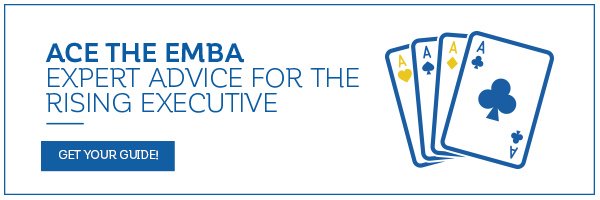
Related Resources:
- School-Specific EMBA Application Essay Tips
- Executive MBA Essays: How to Make an Impact [Sample Essay]
- A Non-Traditional Applicant Accepted to the Columbia EMBA Program , a podcast episode
About Us Press Room Contact Us Podcast Accepted Blog Privacy Policy Website Terms of Use Disclaimer Client Terms of Service
Accepted 1171 S. Robertson Blvd. #140 Los Angeles CA 90035 +1 (310) 815-9553 © 2022 Accepted

- Testimonials
- Case Studies
July 21, 2021
Columbia Business School Essay Guidance (2021-2022)
- Admission Strategy
We have news for you! Read below for our guidance on this year’s CBS essay questions:
Short Answer Question: What is your immediate post-MBA professional goal? (50 characters maximum) Examples of possible responses:
- “Work in business development for a media company.”
- “Join a strategy consulting firm.”
- “Launch a data-management start-up.”
Admitify Guidance: Find a way to include as much specificity and differentiation as possible in the goal statement given the character limit. Don’t just settle for a lazy/short/generic goal statement like ‘management consulting at M/B/B’.
Essay 1: Through your resume and recommendations, we have a clear sense of your professional path to date. What are your career goals over the next three to five years and what, in your imagination, would be your long-term dream job? (500 words)
Admitify Guidance : Be as concrete/specific as possible about your post MBA goals (job titles, org names, short-term Plan A and Plan B, long-term goal). State these goals at the beginning of the essay and then use the rest of the essay to provide the ‘backstory’ — your personal account of where these goals come from. I try to use this essay (in addition to stating your goals) to show where in your experiences these goals come *but also* to share some highlights about your career path to date (in other words, share accomplishments or evidence of fast-track). If space permits, the essay can end with a brief statement of what skills you already have that your goals require and what skills you still lack that your goals require. This can ‘set up’ essay 2. An additional strategy is to also use this first essay to describe how Columbia’s resources fit your post-MBA goals so you don’t have to respond to Columbia’s now-optional ‘Why do you feel Columbia Business School is a good fit for you?’ Why would you want to avoid that prompt? Three reasons: (a) Columbia’s other two optional prompts (book, movie, song and PPIL) offer much richer opportunities for differentiating yourself by sharing stories about you, (b) Columbia’s admissions people know their program well; how likely are you to be able to tell them something about it that really rocks their world?, (c) You *will* be demonstrating amazing alignment between Columbia’s resources and your goals and your deep-diving due diligence on that alignment — but you’ll be doing it in 100-150 words at the end of essay 1, not in 250 words in essay 2. The challenge with this strategy is how to combine your savvy goals statement, your where-these-goals-come-from and goals-related career highlights, and the new Why CBS section into 500 words. But then you hired Admitify, didn’t you? We can help.
Essay 2 and 3: Please respond to two (2) of the three (3) essay questions listed below:
- The Phillips Pathway for Inclusive Leadership (PPIL) is a new co-curricular program designed to ensure that every CBS student develops the skills to become an ethical and inclusive leader. Through PPIL, students attend programming focused on five essential diversity, equity, and inclusion skills: Creating an Inclusive Environment, Mitigating Bias, Communicating Across Identities, Addressing Systemic Inequity, and Managing Difficult Conversations. Tell us about a time you were challenged around one of these five skills. Describe the situation, the actions you took, and the outcome. (250 words)
Admitify Guidance:
This is a classic accomplishment essay (situation/context—>your actions/EQ/problem-solving—>outcome (happy ending + lessons learned). What’s new is the D&IE twist. Columbia, as are other schools, is signaling its institutional interest in this urgent social/business issue. Happily, they’re giving you 5 possible sub themes to choose from (because they know not everyone has been or is expected to be on their firm’s D&I team). Applicants who have been D&I champions at or outside of work may gravitate toward an example relevant to Creating an Inclusive Environment or Addressing Systemic Inequity. The first is asking for a direct D&I scenario; the second could work for someone who has championed broader issues of inequity (e.g., socioeconomics), even if that latter scenario had not overt diversity element. Applicants who are themselves diverse applicants and perhaps particularly those who are LGBTQ may lean toward the Communicating Across Identities skill (e.g., how did you break the silence around the diversity issue you faced?). Those applicants who are not traditionally considered ‘diverse’ may gravitate toward the Mitigating Bias skill (e.g., how did you work to offset your own bias?) or the Managing Difficult Conversations (which need not involve diversity, identity, or bias at all — e.g., how did you simply demonstrate the EQ to overcome a conflict?). Don’t fret if you are not in a diverse applicant group traditionally defined. Columbia’s inclusion of the bias and difficult conversations Orion’s as well as its reference to ‘ethical leadership’ show that they are open to any examples that show you demonstrating EQ/emotional intelligence, good values, or integrity/ethics in a way that makes groups or organizations function more openly.
- Why do you feel Columbia Business School is a good fit for you? (250 words)
Admitify Guidance : This is a straightforward Why Us? Essay but keep in mind in the past Columbia has framed this question in terms of NYC as the ‘very center of business’ and has steered applicants toward discussing its experiential and NYC-connected resources such as Immersion Seminars, master classes, practitioner faculty, etc. So maybe lean the essay toward the practical, hands-on side of Columbia resources rather than the academic (which it shares with most top schools). Also feel free to mention summer or in-term internships you might pursue in NYC.
- “Tell us about your favorite book, movie or song and why it resonates with you” (250 words)
Admitify Guidance: I recommend avoiding clichéd or professionally focused books like Warren Buffet’s biography and cliched movies (‘Wolf of Wall Street’) or songs (e.g., Lady Gaga?). IMO choosing a book shows greater ‘depth’ than a movie or song but more important than projecting depth is that the ‘cultural product’ really matter a ton to you and really capture who you are or what your values/goals are. I recommend using only half the essay at the most to describe this the book, movie or song. Devote the rest of the space to showing why this cultural product matters to you and sharing a specific anecdote or two from your personal life (ideally personal because the other Columbia essays cover your professional life) that connects directly with the book, movie or song. Columbia’s Essay 3 changes almost every year, but it has consistently been the essay where you can get personal and share who you are. So I would lean toward personal and self-disclosing/revealing content here.
Optional Essay: If you wish to provide further information or additional context around your application to the Admissions Committee, please upload a brief explanation of any areas of concern in your academic record or personal history. This does not need to be a formal essay. You may submit bullet points. (Maximum 500 Words)
Admitify Guidance : Columbia is not restricting you to only extenuating circumstance (grades, GMAT, etc.) discussions here, but they are limiting you somewhat to ‘areas of concern.’ But many things – such as your age, leadership or extracurriculars – could be framed as areas of concern. Feel free to discuss multiple areas of concern but separate them into separate paragraphs with headers/titles.
Contact us today for more advice from an expert Admitify coach!
Related Blog Posts
Mba essay guidance 2024-25: yale school of management.
June 5, 2024
Top Tips on How to Prepare Now for Fall MBA Applications
May 8, 2024
MBA Essay Guidance 2023-24: USC Marshall School of Business
March 27, 2024

What to Expect from the 2023-2024 MBA Essay Questions

While we cannot perfectly predict the future, our 16 years of experience as an MBA admissions essay consultant and careful analysis of past trends can help us assess what MBA candidates should expect with this year’s MBA essay questions.
Many MBA hopefuls who have already narrowed their target school lists are anxiously awaiting the release of the 2023-2024 MBA application essay questions and deadlines. In previous years, we have seen MBA essay questions released as early as the beginning of May. Using our insider knowledge of what each school is looking for, as well as successful business school essay examples from past admissions cycles, Personal MBA Coach has already begun working with our round 1 clients on a number of essays.
For this year’s prediction, we have divided top MBA programs into three categories and have included details on which MBA essay or essays to begin working on today!
- MBA programs where at least one MBA application essay is unlikely to change
- MBA programs where smaller changes are most likely
- MBA programs with a higher likelihood of changing the MBA application essay questions
MBA Programs Where at Least One MBA Essay Is Unlikely to Change:
For the programs below, Personal MBA Coach believes that at least one of the 2022-2023 MBA essay questions will return for the 2023-2024 MBA application cycle. If any of the MBA programs below are on your list, we urge you to get started on the relevant MBA application essay questions today!
Harvard Business School
- Stanford GSB
Columbia Business School
Chicago booth.

HBS has asked the same MBA application essay question over the past few years, and we expect this year’s question is likely to remain the same.
HBS’s 2022-2023 MBA Essay Question was:
As we review your application, what more would you like us to know as we consider your candidacy for the Harvard Business School MBA Program?
Stanford Graduate School of Business
Like HBS, Stanford GSB has not changed its MBA essay questions in recent years. While Stanford GSB has made some changes to the required essay length, we would be surprised to see a major essay question change from Stanford.
Stanford’s 2022-2023 MBA essay questions were:
Essay A: What matters most to you, and why?
For this essay, we would like you to reflect deeply and write from the heart. Once you’ve identified what matters most to you, help us understand why. You might consider, for example, what makes this so important to you? What people, insights, or experiences have shaped your perspectives?
Essay B: Why Stanford?
Describe your aspirations and how your Stanford GSB experience will help you realize them. If you are applying to both the MBA and MSx programs, use Essay B to address your interest in both programs.
Columbia Business School’s first MBA essay has taken a similar form over the past years. While the exact wording could vary, we do not expect any significant change in CBS’s first MBA essay question.
Columbia’s 2022-2023 first MBA essay question was:
Through your resume and recommendations, we have a clear sense of your professional path to date. What are your career goals over the next 3-5 years and what, in your imagination, would be your long-term dream job? (500 words)
We also anticipate Columbia Business School’s essay about program fit to remain on the 2022-2023 CBS application.
This MBA essay question was:
Why do you feel Columbia Business School is a good fit for you? (250 words)
Watch Personal MBA Coach’s quick tips video for Columbia Business School application advice:
As with CBS, Wharton has kept its first MBA essay question largely the same for the past few years, and we expect some version of the same essay question this year.
Wharton’s 2022-2023 first MBA essay question was:
How do you plan to use the Wharton MBA program to help you achieve your future professional goals? You might consider your past experience, short and long-term goals, and resources available at Wharton. (500 words)
As with Wharton and CBS, Kellogg also is unlikely to change its essay questions.
Kellogg’s 2022-2023 first MBA essay question was:
Kellogg’s purpose is to educate, equip and inspire brave leaders who create lasting value. Provide a recent example where you have demonstrated leadership and created value. What challenges did you face and what did you learn? (450 words)
Similarly, Kellogg’s second MBA essay question has stayed the same for the past few years, and we do not anticipate that it will change.
Kellogg’s 2022-2023 second MBA essay question was:
Values are what guide you in your life and work. What values are important to you and how have they influenced you? (450 words)
Chicago Booth joins the list of schools for which Personal MBA Coach clients are working on essay #1.
Chicago Booth’s 2022-2023 first MBA essay question was:
How will the Booth MBA help you achieve your immediate and long-term post-MBA career goals? (Minimum 250 words, no maximum)

MIT Sloan’s cover letter essay has not changed in a while, and we expect it to stay the same in the 2023-2024 cycle.
MIT Sloan’s 2022-2023 MBA essay question was:
MIT Sloan seeks students whose personal characteristics demonstrate that they will make the most of the incredible opportunities at MIT, both academic and non-academic. We are on a quest to find those whose presence will enhance the experience of other students. We seek thoughtful leaders with exceptional intellectual abilities and the drive and determination to put their stamp on the world. We welcome people who are independent, authentic, and fearlessly creative — true doers. We want people who can redefine solutions to conventional problems, and strive to preempt unconventional dilemmas with cutting-edge ideas.
Taking the above into consideration, please submit a cover letter seeking a place in the MIT Sloan MBA program. Your letter should conform to a standard business correspondence, include one or more professional examples that illustrate why you meet the desired criteria above, and be addressed to the Admissions Committee (300 words or fewer, excluding address and salutation).
We do not expect the Yale SOM essay question to change from the previous cycle.
Yale SOM’s 2022-2023 MBA essay question:
Describe the biggest commitment you have ever made. (500 words)

MBA Programs Where Smaller Changes Are Most Likely:
- London Business School
Aside from minor tweaks or word limit adjustments, we would be more surprised to see major MBA application essay question changes from these programs.
If one or more of these schools is on your list, we suggest that you begin brainstorming, outlining and hopefully writing your essays as soon as possible. This will free up time (both personally and professionally) as summer nears.
MBA Programs with a Higher Likelihood to Change the MBA Essay Questions:
Below is a list of MBA programs for which Personal MBA Coach recommends that our clients hold off drafting their MBA essays. For some schools in this list, we suggest that you begin brainstorming now as the risk of a change is smaller. For other schools, hold off entirely until the MBA applications open later this spring. There are plenty of other MBA application components that candidates targeting these MBA programs can get started on today!
- Michigan Ross (brainstorm only)
- UCLA Anderson
- Berkeley Haas (brainstorm only)
- Dartmouth Tuck
Keep in mind, the details shared above are predictions only! As soon as this year’s MBA application essay questions are released, Personal MBA Coach will let you know what has changed and will share advice on how to tackle each MBA essay question.
Join our weekly MBA Tips newsletter to be sure you do not miss anything!
Want access to an industry expert’s insight, detailed in-line editing, business school essay examples and more? Personal MBA Coach is willing to be your admission essay consultant! Visit our comprehensive packages to learn more.
About Personal MBA Coach
You also may like these other blog articles:

Find out why we are consistently ranked #1. Sign up for a 30-minute consultation today!
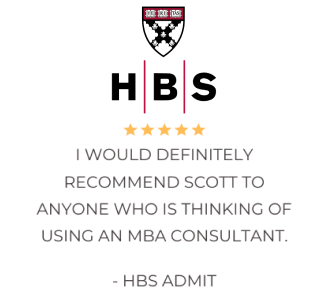
We have over 200 5 Star Reviews. Find out WHY!
schedule consultation
Get the Reddit app
Learn about MBA programs, applying to them, and what life is like while in one and afterwards. Please make sure to read our rules and wiki before posting.
Columbia MBA Essay 2 and 3: does it matter which question we answer?
Columbia MBA Essays for 2022 entry are published. For Essay 2 and 3, there are 3 questions listed and we are asked to answer 2 of the 3 questions:
The Phillips Pathway for Inclusive Leadership (PPIL) is a new co-curricular program designed to ensure that every CBS student develops the skills to become an ethical and inclusive leader. Through PPIL, students attend programming focused on give essential diversity, equity, and inclusion skills: Creating an Inclusive Environment, Mitigating Bias, Communicating Across Identities, Addressing Systemic Inequality, and Managing Difficult Conversations. Tell us about a time you were challenged around one of these five skills. Describe the situation, the actions you took, and the outcome. (250 words)
Why do you feel Columbia Business School is a good fit for you? (250 words)
Tell us about your favorite book, movie, or song and why it resonates with you? (250 words)
I have prepared essays for the 2nd and 3rd question, as they were part of the application last year, and I still tend towards sticking with those two (I like especially the question about favourite book/movie etc. because it is quite personal).
However, the 1st question seems like more sophisticated to me. Would the applicants who answer questions 2 and 3, and leave question 1 out, be at a disadvantage?
By continuing, you agree to our User Agreement and acknowledge that you understand the Privacy Policy .
Enter the 6-digit code from your authenticator app
You’ve set up two-factor authentication for this account.
Enter a 6-digit backup code
Create your username and password.
Reddit is anonymous, so your username is what you’ll go by here. Choose wisely—because once you get a name, you can’t change it.
Reset your password
Enter your email address or username and we’ll send you a link to reset your password
Check your inbox
An email with a link to reset your password was sent to the email address associated with your account
Choose a Reddit account to continue
A business journal from the Wharton School of the University of Pennsylvania
Knowledge at Wharton Podcast
What does your writing style say about you, july 23, 2024 • 15 min listen.
Wharton’s Jonah Berger explains how writing style can predict future success.

Listen to the podcast.
Wharton marketing professor Jonah Berger discusses his published study, “ Topography of Thought ,” which was co-authored with Olivier Toubia , business professor at Columbia Business School. The paper examines how someone’s writing style can be indicative of their future success, and where generative AI might come into the picture.
Read an edited transcript below.
Studying How Successful People Think
Angie Basiouny: Give us an overview of this paper by way of explaining your title. What is topography of thought?
Jonah Berger: I don’t have to tell you that we all use language all the time. We write emails, make presentations, and submit job applications. We use language all the time. And language, in some sense, is a fingerprint. It reveals or reflects things about the people who produce it. You can predict how extraverted someone is, for example, based on the words they use.
But beyond the individual words people use, might the pattern of ideas they put out there, the way they organize their ideas, reveal something interesting about them and their likelihood of future success?”
I think it’s important to talk about what I mean about the pattern of ideas. When someone talks about something, they can cover a small amount of ground or a large amount of ground. If you ask someone about their work history, for example, they can talk about a variety of things they’ve done or a smaller set of things they’ve done. They can cover a lot of ground or a little bit of ground.
If you want to use an analogy here, you can almost think about going for a run. Someone can go for a run and go all the way around the city, or they can go for the same number of miles, but just go around the block a number of times. In both cases, they did the same distance, but they covered more ground in one than the other. So, one way we express ideas is the amount of ground we cover. We cover more ground with our ideas, or less. We can talk about more ideas, more topics, more themes, more things that are disparate from one another, or things that are related to one another.
But it’s not just that. It’s also the speed with which we move between adjoining ideas. Imagine a movie. It can cover more or less ground across the course of the movie, but it can also move faster or slower between ideas. If a movie has one scene, for example, that’s at the beginning of a wedding, if the next scene is the later part in a wedding, that’s related to the first part. Different things may happen, but it’s pretty closely related. But if you jump from a wedding to an action scene, that would be really different sorts of ideas. They’re not very related. They’re moving further across those two points.
We wondered if these two ideas, how much ground someone covers, and how quickly they move between ideas, might tell us something about their likelihood of future success.
Basiouny: You’re not talking about the length of the piece of writing. You’re not talking about whether it’s a 500-word essay or 1,000-word essay. It’s really about how they use that space to move through their ideas. Correct?
Berger: Yes, great point. It’s not about the length. It’s about the ground covered. Are they covering a lot of ground in their hundred or thousand words, whatever it is? Or are they covering less ground? Someone talking about their vacation could share 1,000 words, but they could use those words to talk just about the food they ate, or also to talk about the sights they saw and the places they visited. The former would cover less ground while the latter would cover more.
Basiouny: How did you go about studying this?
Berger: The same ideas can be applied to any type of content, but here we looked at college applications. In other work we’ve looked at online reviews, and in related work we looked at books, movies, and TV shows.
We took 40,000 college application essays from a variety of folks who were applying to school, and we looked at what they wrote and the topography of thought of what they wrote — how much ground they covered in that essay. Again, similar length, but how much ground they covered, and how quickly they moved between ideas. And we looked at their future success. How well did they do in school? What was their GPA once they got there? We were interested in seeing whether, not just the individual words they use, but the way they express ideas might that reveal something or predict how likely they are to be successful in the future.
The Essay Writing Style That’s Linked to Greater Success
Basiouny: What did you find?
Berger: We found two very important things. First, covering more ground, that notion of covering a broad range of things in the same amount of length, was linked to greater success. But doing so while moving rather slowly, was also important.
Think about the numbers arrayed on a circular clock. You could cover a lot of ground by moving in a circle, (e.g., going from 12 to 1 to 2 to 3 to 4) or by traversing the same ground but going from like 12 to 6 to 1 to 7 to 3 to 11. You’ve covered the same amount of ground, but you’ve taken a much longer route between each individual point.
What we found is that folks who are successful in school are able to blend these two things that might seem mutually exclusive. It might seem like covering a lot of ground requires moving really quickly between points to get there. But folks that end up doing well in school figure out a way to cover that ground really efficiently. They’re able to do so by moving slowly between these points, and they don’t have to take a lot of big jumps along the way.
Basiouny: In this paper, you controlled for some socioeconomic factors. Can you talk about that a little bit?
Berger: Yes, so someone could wonder, “OK, so you’ve found that people did well in school, and you’re using writing as a way to indicate how they think. But does it indicate something else?” Maybe it’s just that people who do better on the SAT also have higher grades and also tend to write a certain way. Maybe it’s that people who have parents who are more educated tend to write a certain way and also do better in school. Or maybe people who have parents who are more educated can afford to pay for an essay consultant who helps them write a certain way and also helps them do better in school.
So, we controlled for a variety of different things. We controlled for what they wrote about. Maybe certain types of people tend to write about certain types of things, rather than other types of things. Maybe it’s not about how they write, it’s about what they wrote about — the topics or themes they discussed. No, it wasn’t that.
Maybe it’s parents’ education. No, we controlled for that. Maybe it’s SAT scores. No, we can control for that. What this suggests is that the topography of thought goes beyond things related to just socioeconomic factors or family background. It’s not just that people who might have had wealthier families, for example, tend to write a certain way or have application consultants and do better in school because they get tutoring. No, it really suggests that writing reveals something about the way we think, which can reveal or predict our likelihood of being successful in the future.
Implications Beyond College Essay Writing
Basiouny: There are other critical forms of writing that we do every day in business, like cover letters, resumes, a press release, communications to the C-suite. Can you take this research and translate it into a business context?
Berger: What I find fascinating about these ideas is yes, we looked at the case of college application essays, but it doesn’t have to be only about application essays. These same ideas should apply more broadly to a variety of contexts, whether it’s a cover letter that someone writes, whether it’s an online review that someone puts together, whether it’s the emails they write at the office — all these things provide insight into who people are and what they’re likely to do in the future. I think on a previous episode that you had me on, I talked about a paper I loved recently, where they can tell whether someone is going to default on the loan or not by the language they use in their application. Similarly, you can predict whether someone is going to get promoted or fired or leave a job for a better opportunity elsewhere based on the language they use in their email.
Most of this work that I just mentioned is using individual words, but I think what our work suggests beyond the individual words someone used, you can get insight into who they are, how they think, and how well they’re going to do in the future, based on the pattern of ideas that they have or their topography of thought.
Basiouny: As a manager, it gives you an indication of how they might move through their physical work or their knowledge work, right?
Berger: Yes, one thing we’re looking at right now is, as people learn more, does that change the way their topography of thought looks? Obviously, as we gain more knowledge in a given domain, we may talk differently. We may think about ideas differently. One thought we have is, “Hey, if people who are able to cover a lot of ground really efficiently by moving slowly between points, how did they get there? Are they naturally that way?” Probably not. They may have gained more knowledge along the way that allows them to represent their ideas differently.
One thing we’re doing right now is looking at online forums where people write multiple reviews over time. Someone, for example, might write hundreds of wine reviews over the years. They’ve learned more about wine years later. We’re looking at how do they represent ideas differently as they gain knowledge? And that may help us understand why people who represent ideas certain ways end up doing better.
Humans Still Write Better than ChatGPT and Gen AI — For Now
Basiouny: ChatGPT and artificial intelligence have entered the conversation. People have access to these free tools that can help them perfect their cover letters and written business communication. How does this change things? We can’t really tell how good someone’s topography of thought is if they have an AI-assisted piece of writing. What do we do?
Berger: Yes, so I’d say a couple of things. I agree with much of what you said, except one word. I’m not sure they allow you to “perfect” your writing. At least at the moment. What they do is allow you to write something pretty good quickly and easily. You give it a prompt, and it produces content that’s pretty interesting, does a pretty good job of doing something that might have been difficult for you to do.
And to a degree it uses your own content somehow. Like you could say, “Take my CV and use it to put together a cover letter based on my past experiences.” So that is based on you, and someone else’s might look different, to the degree that their CV is different, but I wouldn’t say it necessarily perfects anything. At least at the moment.
Certainly, tools like ChatGPT and others have made the production of content much easier, and I can imagine a time down the road where we do use them for many tasks, rather than writing ourselves. But I still think there is a lot to be understood about how language reflects the people that produce it and how to write more effective content, based on understanding what makes language impactful.
More From Knowledge at Wharton

Vera Bradley CEO: Company Rebrands Need to Reset the Brand Health

Ciara Dilley, VP of Marketing for Global Brands at PepsiCo

Marketplace Dignity: The Hidden Driver of Customer Engagement
Looking for more insights.
Sign up to stay informed about our latest article releases.
Numbers, Facts and Trends Shaping Your World
Read our research on:
Full Topic List
Regions & Countries
- Publications
- Our Methods
- Short Reads
- Tools & Resources
Read Our Research On:
How the origins of America’s immigrants have changed since 1850
The United States is the top destination in the world for people moving from one country to another. Over 70 million immigrants have arrived in the U.S. since 1965 , according to a Pew Research Center analysis of Census Bureau data. About 18 million have come from Mexico, making up the largest wave of immigration from a single country to the U.S.
In 2022, the number of immigrants living in the U.S. reached a high of 46.1 million, accounting for 13.8% of the population. (This includes both legal and unauthorized immigrants.)
These immigrants trace their roots to virtually all countries around the world. The largest numbers hail from Mexico (10.6 million) and India (2.8 million). That’s different from a century ago: In 1920, the largest immigrant populations were from Germany and Italy.
Pew Research Center conducted this analysis to explore how immigration patterns have changed throughout the United States and by state over time.
The maps and data in this analysis are based on Center tabulations of Census Bureau microdata from IPUMS USA . The maps show the largest country of birth for immigrants in each state or territory from 1850 to 2022. The tabulations agree as closely as possible with published Census Bureau data on the national and state foreign-born populations and other national data on the country of birth of immigrants.
Data: For the 1850-1880 and 1900-1940 censuses, the tabulations use complete count census data, which has one record for each person counted in the census. The census data comes from 1% samples for 1950 and 1970 (form 1 for 1970). For the 1960 and 1980-2000 censuses, it comes from 5% samples. For 2010 and 2022, we use the 1% sample from the American Community Survey (ACS).
States and territories: Before 1960, some censuses included data for territories that would later become states. When available, we show data for these areas and designate the territorial status in the maps with an asterisk (*). Prior to 1959, Alaska and Hawaii were not routinely represented in IPUMS datasets used in this analysis. However, IPUMS samples that include these two areas in 1900-1920 (1% samples) and 1930 (5% sample) provide data for the maps.
Immigrant population: The immigrant or foreign-born population consists of people born outside the United States or its territories who are not U.S. citizens at birth. In census data for 1970-2000 and ACS data for 2010-2022, there is a direct question on U.S. citizenship that defines the foreign-born population.
For the earlier censuses, we used several steps to define the immigrant and U.S.-born or native populations. First, people born in U.S. territories and outlying areas are considered part of the native population.
The territories defined as part of the native population are: Alaska (1870 and later); Hawaii, Puerto Rico, Guam and American Samoa (1900 and later); Philippines (1900-1940); Panama Canal Zone (1900-1970); U.S. Virgin Islands (1920 and later); Trust Territory of the Pacific (1950-1980); and Northern Mariana Islands (1950 and later).
Beginning with the 1890 census, people born outside the U.S. and its territories were considered U.S. citizens at birth if they had one or two American-born parents under certain conditions. The criteria have changed over time and do not appear to have been consistently applied in the early censuses. The IPUMS data has coded some of these cases directly. For other cases, we use the country of birth of each respondent’s mother and father (either as reported in the census or assigned by IPUMS) to determine whether the individual is foreign born.
Country of birth: Countries of birth in the tabulations generally reflect the countries and regions within countries (e.g., Alsace-Lorraine, Bavaria) recognized at the time the data was collected. This reflects the responses to the census and generally agrees with official publications from the censuses. The country boundaries are similar to modern ones but may differ slightly in some cases.
The groupings used for the countries in the census and ACS data are:
- United Kingdom: England, Scotland, Wales and Channel Islands in all years; Northern Ireland in 1930 and later.
- Germany: Various German states, East Germany and West Germany in all years; Alsace and Lorraine for 1870-1910.
- Austria: Austria and regions defined as Austria, including Austria-Hungary.
- Poland: Regions defined as Poland, Austrian Poland, German Poland, Russian Poland, Prussian Poland, Galicia, Pomerania, West Prussia and various other areas.
- Russia (1850-1920), USSR (1930-1990), USSR (former): These designations basically refer to the same area. It includes Russia plus the republics within the Soviet Union (e.g., Estonia, Belarus, Ukraine, Kazakhstan, Siberia). The exception is Armenia, which is treated as a separate country for 1920-1930.
- China: Mongolia and Taiwan for 1850-1940; Hong Kong and Macau for 2000-2022.
- Portugal: Azores, Madeira Islands and St. Miguel in all years; Cape Verde Islands through 1970.
- Korea: North and South Korea.
Various other countries and regions are grouped together, but none are the top origin countries for states or in the top five origin countries nationally.
Immigrant populations by state
The share of immigrants varies widely among states, from 2% in West Virginia to 27% in California. In 2022, Mexican immigrants were the largest group in 29 states, while Indian immigrants were the largest group in six states.
Mirroring the national trend, the origins of immigrants living in each state have changed dramatically in the past century. In 1920, the largest immigrant groups in 29 states were born in Germany, Italy or Canada. And only six states had the same largest origin group in 2022 that they did in 1920: Arizona, New Mexico and Texas (all from Mexico) and Maine, Montana and Vermont (from Canada).
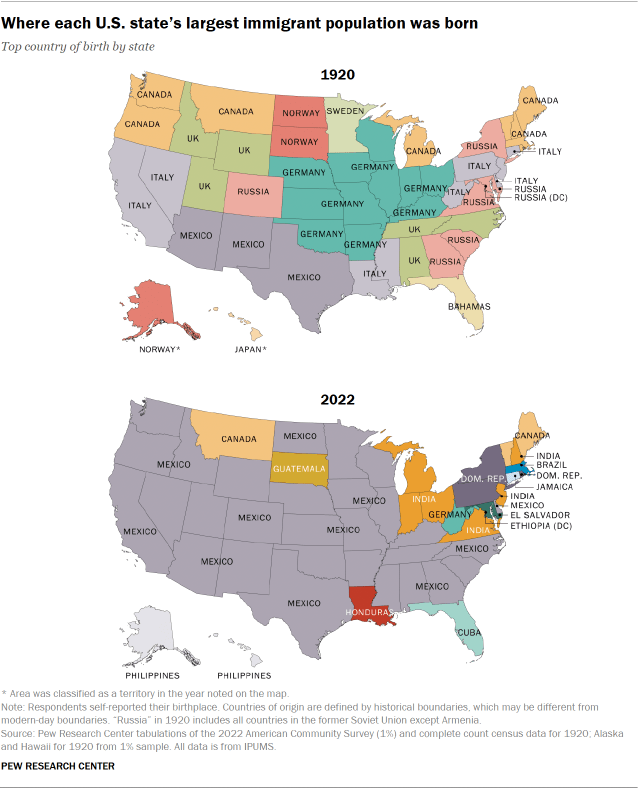
Why has the immigrant population changed over the years?
Reasons behind the changes in the U.S. immigrant population since 1965 include:
- A more equitable U.S. immigration law . The 1965 Immigration and Nationality Act opened up legal immigration from Asia and Latin America. The law it replaced had favored immigrants from Northern and Western Europe and mostly barred those from Asia.
- Unauthorized immigration. Unauthorized immigration to the U.S. began to grow in the 1970s , which made the total number of immigrants go up. Most of those who came before 1982 acquired legal status after the passage of the 1986 Immigration Reform and Control Act . However, unauthorized immigrants continued to come in large numbers.
- Further changes in U.S. immigration law. A revision to the 1965 act in 1990 allowed more legal immigrants to enter the U.S. and provided alternative ways for people to immigrate, increasing the diversity of origins.
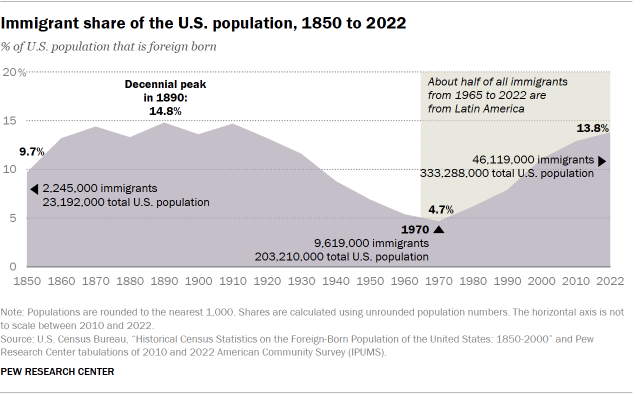
Where immigrants have settled in the U.S. over time
The first large wave of immigration to the U.S. began in the 1840s and lasted until 1889. During this time, more than 14 million immigrants came to the country. Most arrived from Northern or Western Europe ; Germany, Ireland and the United Kingdom alone accounted for 70% of the new arrivals .
How America’s source of immigrants has changed over time
Top country of birth among U.S. immigrants, by state
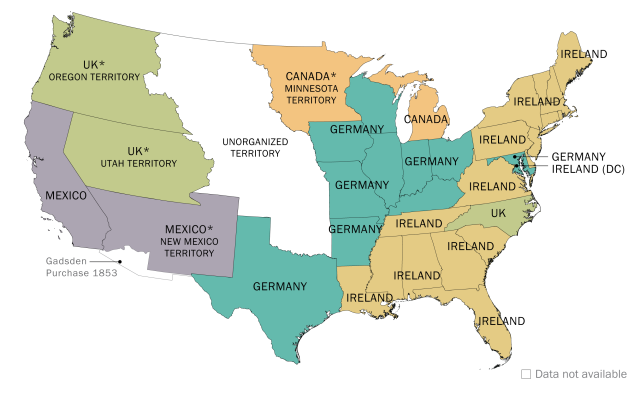
Top five foreign-born populations by country of origin (in millions)
Total U.S. population 23.2 million Total foreign born 2.2 million Percentage foreign born 9.7%
Note: Populations rounded to nearest 10,000. Shares and ranks based on unrounded numbers. Germany includes East and West Germany (1980-1990), German states coded by IPUMS (1850-1940). Alsace and Lorraine are part of Germany for 1870-1910 and France in other years. United Kingdom (UK) includes England, Scotland, Wales and Channel Islands in all years and Northern Ireland in 1930 and later. China includes Mongolia and Taiwan for 1850-1940; Hong Kong and Macau for 2000 and later. Poland includes areas designated as Poland by IPUMS (1850-1940) including “Austrian,” “German,” “Prussian” and “Russian” Poland. The term “Russia” is used for 1850-1920, “USSR” for 1930-1990 and “USSR (former)” for 2000 and later. These areas encompass all former republics of the USSR including Baltic states in all years. The only exception is Armenia which is coded separately in 1930-1940. Various other areas have been grouped together but do not appear in the top five countries for the U.S. Source: U.S. Census Bureau, “ Historical Census Statistics on the Foreign-Born Population of the United States: 1850-2000 ”; Pew Research Center tabulations of complete count census data for 1850-1940; census samples for 1950 (1%), 1960, 1980-2000 (5%) and 1970 (1% form 1); 2010 and 2022 American Community Survey (1%). Alaska and Hawaii from samples for 1900-1920 (1%) and 1930 (5%). All data from IPUMS.
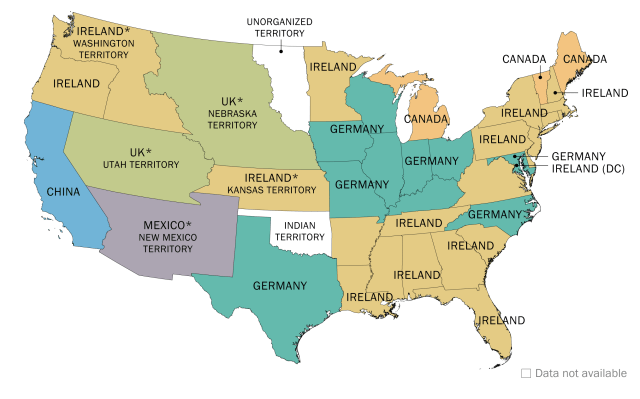
Total U.S. population 31.4 million Total foreign born 4.1 million Percentage foreign born 13.2%
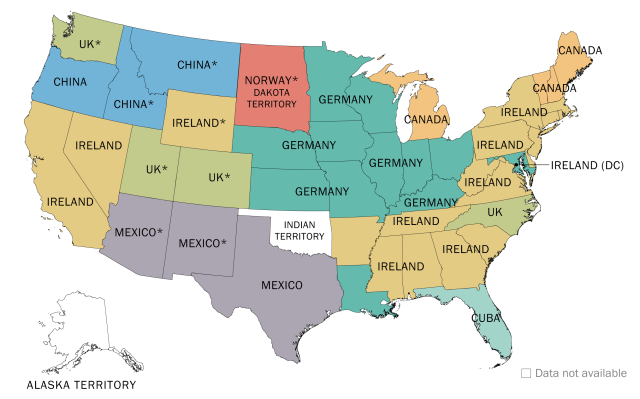
Total U.S. population 38.6 million Total foreign born 5.6 million Percentage foreign born 14.4%
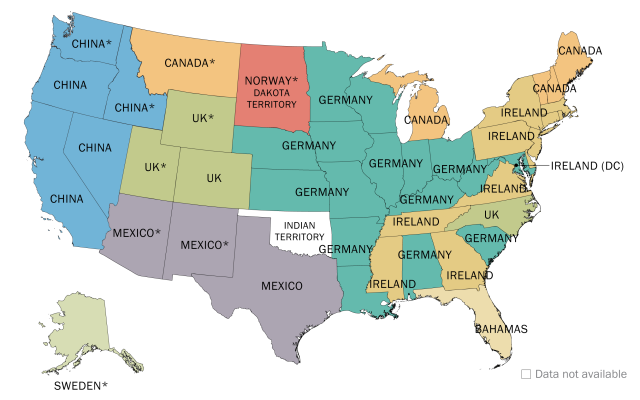
Total U.S. population 50.2 million Total foreign born 6.7 million Percentage foreign born 13.3%
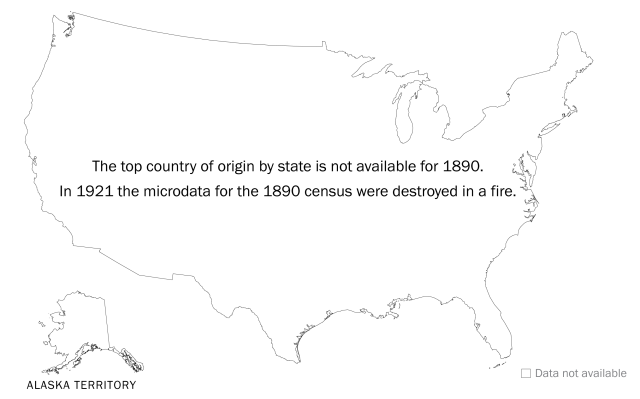
Total U.S. population 62.6 million Total foreign born 9.3 million Percentage foreign born 14.8%
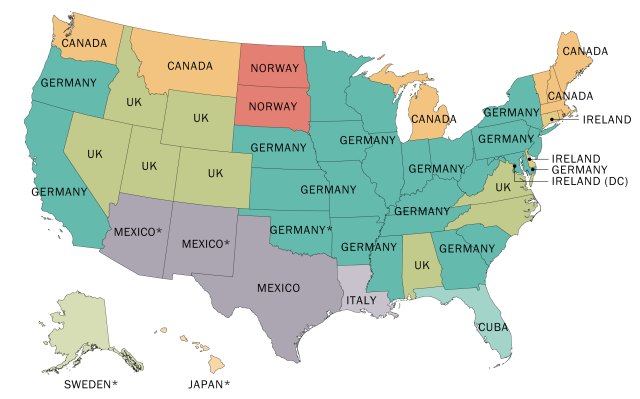
Total U.S. population 76.0 million Total foreign born 10.3 million Percentage foreign born 13.6%
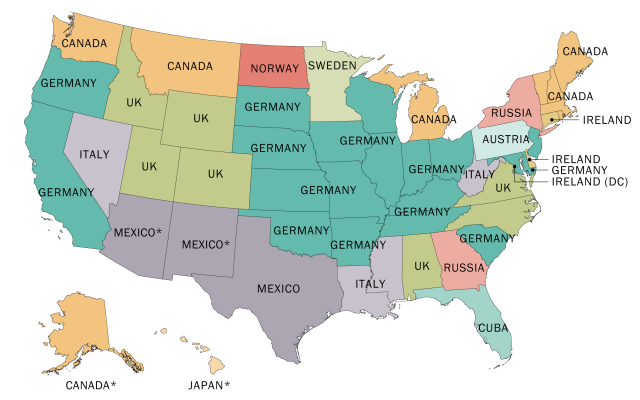
Total U.S. population 92.0 million Total foreign born 13.5 million Percentage foreign born 14.7%
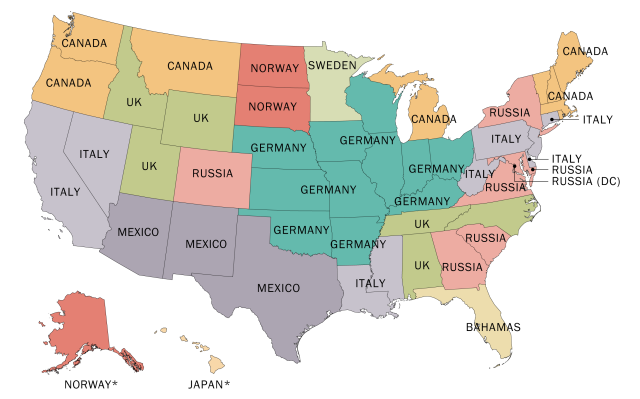
Total U.S. population 105.7 million Total foreign born 13.9 million Percentage foreign born 13.2%

Total U.S. population 122.8 million Total foreign born 14.2 million Percentage foreign born 11.6%
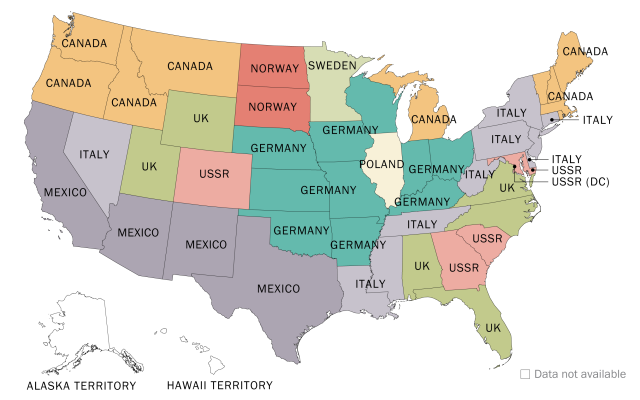
Total U.S. population 131.7 million Total foreign born 11.6 million Percentage foreign born 8.8%
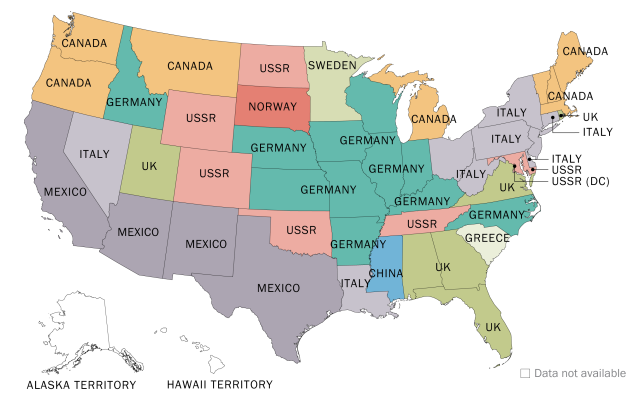
Total U.S. population 150.2 million Total foreign born 10.3 million Percentage foreign born 6.9%
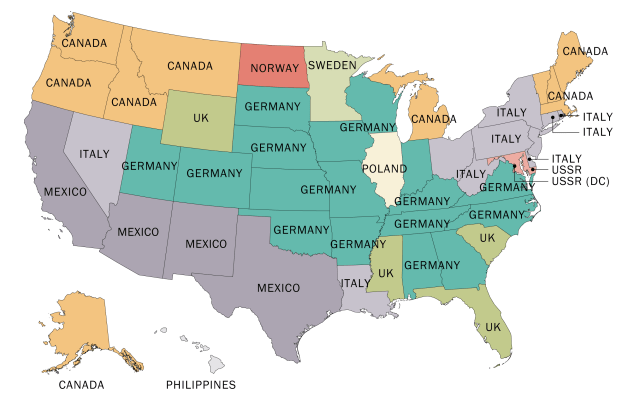
Total U.S. population 179.3 million Total foreign born 9.7 million Percentage foreign born 5.4%
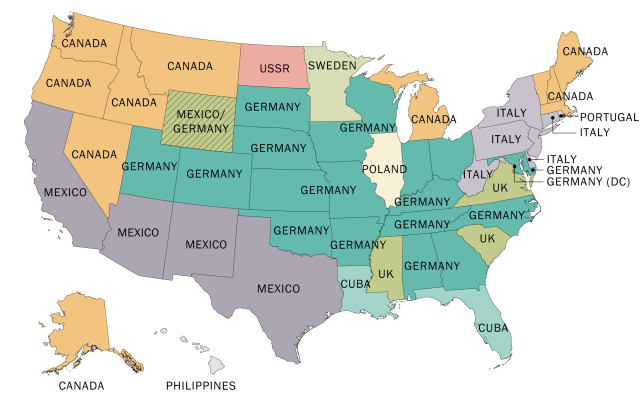
Total U.S. population 203.2 million Total foreign born 9.6 million Percentage foreign born 4.7%
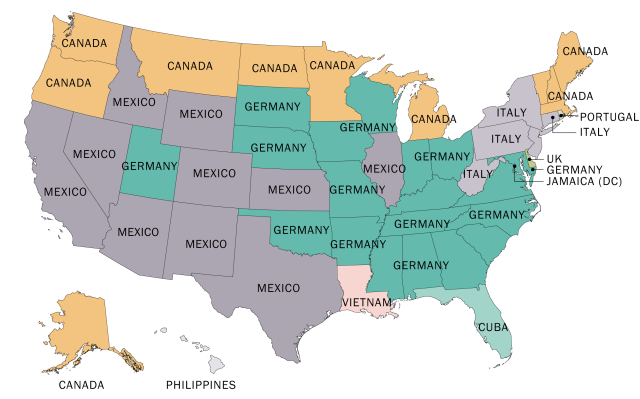
Total U.S. population 226.5 million Total foreign born 14.1 million Percentage foreign born 6.2%

Total U.S. population 248.7 million Total foreign born 19.8 million Percentage foreign born 7.9%
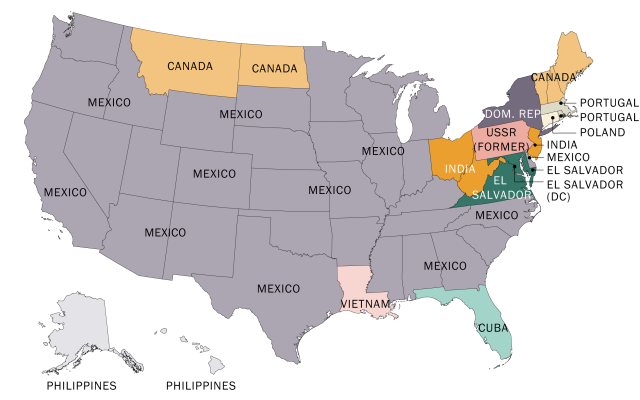
Total U.S. population 281.4 million Total foreign born 31.1 million Percentage foreign born 11.1%
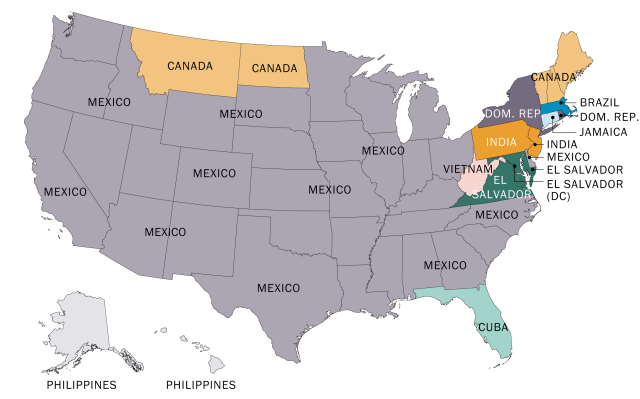
Total U.S. population 309.4 million Total foreign born 40.0 million Percentage foreign born 12.9%
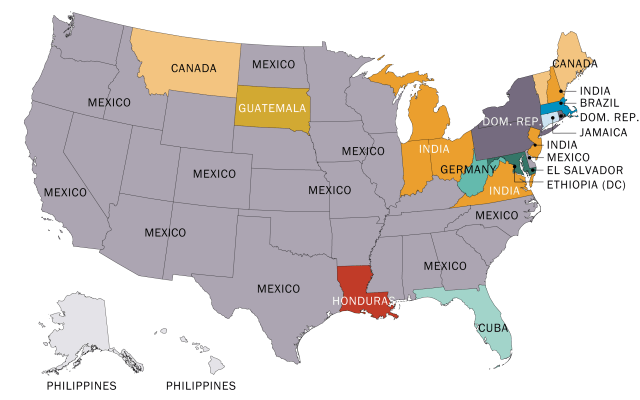
Total U.S. population 333.3 million Total foreign born 46.1 million Percentage foreign born 13.8%
From 1850 to 1880, Germany and Ireland were the largest immigrant origin countries in most states and territories. In 1860, Ireland was the largest origin country in 22 of the nation’s 39 states and territories.
By 1880, Germany was the largest origin country in 16 states and territories. Chinese immigrants were the largest group in California, Nevada, Oregon, and the Idaho and Washington territories. Mexicans were the largest group in Texas and the New Mexico and Arizona territories.
The next wave of immigration to the U.S. lasted from 1890 to 1919, when more than 18 million immigrants arrived. By then, over 60% came from Eastern and Southern Europe, with large numbers arriving from Italy, Austria-Hungary, Russia and Poland.
The number of new immigrants fell dramatically in the years between World War I and World War II (1919 to 1939). As a result, the largest immigrant groups in each state did not change much for the next few decades.
In 1920, German immigrants were the largest group in 11 states, down from 18 in 1910. Immigrants from Italy and Russia became the largest groups in a growing number of states. At their peaks, Italians were the largest group in 10 states in 1940 and 1960, and Russians were the biggest in seven states in 1920 and 1950.
By 1960, the largest number of immigrants in most states came from Germany (17 states), Italy (10) and Canada (10).
Another wave of immigration began in 1965. Most immigrants in this wave came from Latin America (49%) or Asia (27%) . Mexico alone accounted for about 25% of these new immigrants. Large numbers also came from China, India, the Philippines, Central America and the Caribbean.
After 1990, the number of unauthorized immigrants in the U.S. started to grow quickly, from 3.5 million to 12.2 million in 2007. Most unauthorized immigrants in the U.S. at this time came from Mexico, which was also the largest source of legal immigrants.
These new legal and unauthorized arrivals led to major changes in states’ immigrant populations. Mexican immigrants became the largest group in an increasing number of states.
In 1980, Mexican immigrants were the largest group in 10 states, trailing German immigrants (19 states) and Canadian immigrants (11 states).
By 2000, Mexican immigrants were the largest group in 31 states, and Germans were no longer the largest immigrant group in any state. Immigrants from Cuba, El Salvador, the Dominican Republic, Vietnam, the Philippines and India were the largest groups in 11 states.
The onset of the Great Recession led to changes in immigration patterns. Mexican immigration to the U.S. slowed dramatically after 2007. As a result, the Mexican immigrant population stopped growing. Though Mexico remained the largest source of U.S. immigrants, Mexicans’ share of the immigrant population fell from 29% in 2010 to 23% in 2022.
Meanwhile, immigration from Asia increased rapidly. In the 2010s, there were more new arrivals from Asia than from Latin America .
The unauthorized immigrant population declined from 12.2 million in 2007 to 10.2 million in 2019. Since then, though, the unauthorized immigrant population has grown again, reaching 11.0 million in 2022 .
Mexico remained the largest country of birth for immigrants in 29 states in 2022, while India was the largest in six states. For the first time, the following origin groups made up the largest immigrant population in a state or district:
- Ethiopians in the District of Columbia
- Guatemalans in South Dakota
- Hondurans in Louisiana
Note: This is an update of a post originally published Oct. 7, 2015.
- Immigration & Migration
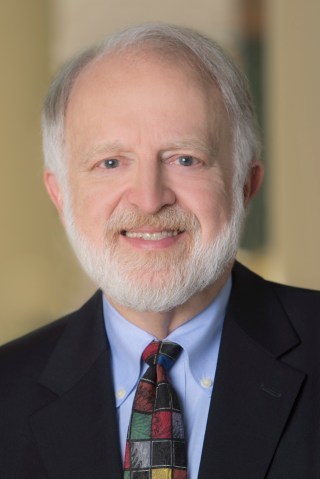
Jeffrey S. Passel is a senior demographer at Pew Research Center .

Jens Manuel Krogstad is a senior writer and editor at Pew Research Center .
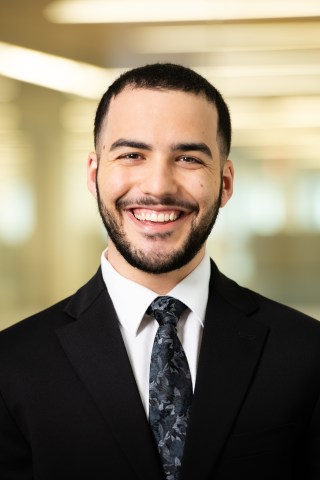
Mohamad Moslimani is a research analyst focusing on race and ethnicity at Pew Research Center .
What the data says about immigrants in the U.S.
Facts on u.s. immigrants, 2018, building outpaces population growth in many of china’s urban areas, most popular.
901 E St. NW, Suite 300 Washington, DC 20004 USA (+1) 202-419-4300 | Main (+1) 202-857-8562 | Fax (+1) 202-419-4372 | Media Inquiries
Research Topics
- Email Newsletters
ABOUT PEW RESEARCH CENTER Pew Research Center is a nonpartisan fact tank that informs the public about the issues, attitudes and trends shaping the world. It conducts public opinion polling, demographic research, media content analysis and other empirical social science research. Pew Research Center does not take policy positions. It is a subsidiary of The Pew Charitable Trusts .
© 2024 Pew Research Center
We can improve your MBA profile and boost your candidacy. Gain insight into the review process and eliminate weaknesses from your MBA application.
Note: You must have javascript enabled to submit the form.
Why is HBS Requiring the GMAT Business Writing Assessment?

If you submit a GMAT Focus score with your MBA application to Harvard Business School , prepare to supply additional proof that you know how to write. With the rise of generative AI, business schools want to confirm that admitted students have the critical thinking and communication skills needed for success. Enter the GMAC Business Writing Assessment.
The Graduate Management Admission Council felt that traditional application materials don’t give a complete picture of a candidate’s readiness. Since the GMAT Focus Edition does not contain a writing section, HBS says it worked with GMAC to offer an official writing assessment for those test-takers.
“We believe that giving candidates multiple options will allow them to select the standardized test that enables them to best display their writing skills,” the school explains.
“The writing assessment allows us to directly observe your unaided writing and reasoning abilities to supplement what we learn about you from other application components,” HBS says. “It will be considered as one data point among many that provides insight into your written communication skills.”
Don’t Let Chat GPT Write Your MBA Essays
Other business schools, such as the MIT Sloan School of Management, may soon follow suit. John A. Byrne, editor of Poets & Quants, believes the move disadvantages the GMAT compared to the GRE. He writes that adding a 30-minute test that costs $30 and requires up to six hours of prep time could encourage more applicants to choose the GRE over the GMAT.
With the extra writing test, GMAT test-takers could end up paying $305 in total, nearly 40% more than the GRE’s $220 price tag.
Byrne also points out that adding a writing assessment makes the GMAT option 47 minutes longer than the GRE.
The GMAC Business Writing Assessment Format
The new writing assessment helps admissions teams make better decisions, GMAC says. The tool provides insights into MBA aspirants’ reasoning and writing abilities, such as:
- Writing in a structured and organized way.
- Analyzing and presenting evidence through written communication.
- Using reason and logic in an argument.
- Expressing ideas clearly and concisely in English.

How it Works
The Business Writing Assessment is a 30-minute online test where you analyze and critique the reasoning and evidence behind a given argument. The topics cover various business and general interest subjects; no specific prior knowledge is needed.
Each assessment is scored on a scale of 0 to 6 using a standardized rubric. You will receive your score within 3-5 days of completing the test and can send your results to participating schools for free. If you’re unsatisfied with your score, you can request a rescore for a fee.
Harvard Business School says there is no minimum score requirement for the GMAC Business Writing Assessment. The admissions committee will evaluate it in the context of the rest of the application. Other English language tests (TOEFL, IELTS, PTE, or Duolingo) will satisfy the writing assessment requirement for candidates who studied at a university where English isn’t the sole instruction language.
Registration for the GMAC Business Writing Assessment opens soon—visit mba.com for more details.
Stacy Blackman Consulting offers multiple services to meet your MBA application needs, from our All-In Partnership to test prep to hourly help with targeted tasks. Contact us today for a free 15-minute advising session to talk strategy with a Principal SBC consultant.
Here’s a snapshot of the caliber of expertise on our SBC team .
HBS Admissions Board at Harvard Business School HBS MBA
HBS Admissions Board at Harvard Business School Kellogg MBA
Director HBS Admissions at Harvard Business School MBA, the Wharton School
HBS Admissions Board at Harvard Business School
Director HBS Admissions at Harvard Business School HBS MBA
Admissions Officer at Stanford's Graduate School of Business (GSB) MBA, Stanford's Graduate School of Business (GSB)
Asst Director MBA Admissions at Stanford's Graduate School of Business (GSB) Director MBA Admissions at Berkeley’s Haas School of Business
MBA, Stanford's Graduate School of Business (GSB) Minority Admissions, the GSB Diversity Programs, the GSB
Associate Director MBA Admissions at the Wharton School at the University of Pennsylvania
Associate Director MBA Admissions and Marketing at the Wharton MBA’s Lauder Institute
Director, the Wharton School at the University of Pennsylvania Professional Writer
Assistant Director MBA Admissions at Columbia Business School (CBS) NYU Admissions
Assistant Director MBA Admissions at Columbia Business School (CBS) M.S.Ed, Higher Education, U of Pennsylvania
Associate Director MBA Admissions at Columbia Business School (CBS)
Ashley is a former MBA Admissions Board Member for Harvard Business School (HBS), where she interviewed and evaluated thousands of business school applicants for over a six year tenure. Ashley holds an MBA from HBS. During her HBS years, Ashley was the Sports Editor for the Harbus and a member of the B-School Blades Ice Hockey Team. After HBS, she worked in Marketing at the Gillette Company on Male and Female shaving ...
Kerry is a former member of the Admissions Board at Harvard Business School (HBS). During her 5+ year tenure at HBS, she read and evaluated hundreds of applications and interviewed MBA candidates from a wide range of backgrounds across the globe. She also led marketing and outreach efforts focused on increasing diversity and inclusion, ran the Summer Venture in Management Program (SVMP), and launched the 2+2 Program during her time in Admissions. Kerry holds a B.A. from Bates College and ...
A former associate director of admissions at Harvard Business School, Pauline served on the HBS MBA Admissions Board full-time for four years. She evaluated and interviewed HBS applicants, both on-campus and globally. Pauline's career has included sales and marketing management roles with Coca-Cola, Gillette, Procter & Gamble, and IBM. For over 10 years, Pauline has expertly guided MBA applicants, and her clients h ...
Geri is a former member of the Admissions Board at Harvard Business School (HBS). In her 7 year tenure in HBS Admissions, she read and evaluated hundreds of applications and interviewed MBA candidates from a diverse set of academic, geographic, and employment backgrounds. Geri also traveled globally representing the school at outreach events in order to raise awareness for women and international students. In additio ...
Laura comes from the MBA Admissions Board at Harvard Business School (HBS) and is an HBS MBA alumnus. In her HBS Admissions role, she evaluated and interviewed hundreds of business school candidates, including internationals, women, military and other applicant pools, for five years. Prior to her time as a student at HBS, Laura began her career in advertising and marketing in Chicago at Leo Burnett where she worked on th ...
Andrea served as the Associate Director of MBA Admissions at Harvard Business School (HBS) for over five years. In this role, she provided strategic direction for student yield-management activities and also served as a full member of the admissions committee. In 2007, Andrea launched the new 2+2 Program at Harvard Business School – a program targeted at college junior applicants to Harvard Business School. Andrea has also served as a Career Coach for Harvard Business School for both cu ...
Jennifer served as Admissions Officer at the Stanford (GSB) for five years. She holds an MBA from Stanford (GSB) and a B.S. in Chemical Engineering from University of Illinois Urbana-Champaign. Jennifer has over 15 years experience in guiding applicants through the increasingly competitive admissions process into top MBA programs. Having read thousands and thousands of essays and applications while at Stanford (GSB) Admiss ...
Erin served in key roles in MBA Admissions--as Director at Haas School of Business at UC Berkeley and Assistant Director at Stanford's Graduate School of Business (GSB). Erin served on the admissions committee at each school and has read thousands of applications in her career. At Haas, she served for seven years in roles that encompassed evaluation, outreach, and diversity and inclusion. During her tenure in Admissions at GSB, she was responsible for candidate evaluation, applicant outreach, ...
Susie comes from the Admissions Office of the Stanford Graduate School of Business where she reviewed and evaluated hundreds of prospective students’ applications. She holds an MBA from Stanford’s GSB and a BA from Stanford in Economics. Prior to advising MBA applicants, Susie held a variety of roles over a 15-year period in capital markets, finance, and real estate, including as partner in one of the nation’s most innovative finance and real estate investment organizations. In that r ...
Dione holds an MBA degree from Stanford Business School (GSB) and a BA degree from Stanford University, where she double majored in Economics and Communication with concentrations in journalism and sociology. Dione has served as an Admissions reader and member of the Minority Admissions Advisory Committee at Stanford. Dione is an accomplished and respected advocate and thought leader on education and diversity. She is ...
Anthony served as the Associate Director of MBA Admissions at the Wharton School at the University of Pennsylvania, where he dedicated over 10 years of expertise. During his time as a Wharton Admissions Officer, he read and reviewed thousands of applications and helped bring in a class of 800+ students a year. Anthony has traveled both domestically and internationally to recruit a ...
Meghan served as the Associate Director of Admissions and Marketing at the Wharton MBA’s Lauder Institute, a joint degree program combining the Wharton MBA with an MA in International Studies. In her role on the Wharton MBA admissions committee, Meghan advised domestic and international applicants; conducted interviews and information sessions domestically and overseas in Asia, Central and South America, and Europe; and evaluated applicants for admission to the program. Meghan also managed ...
Amy comes from the Wharton School of the University of Pennsylvania where she was Associate Director. Amy devoted 12 years at the Wharton School, working closely with MBA students and supporting the admissions team. During her tenure at Wharton, Amy served as a trusted adviser to prospective applicants as well as admitted and matriculated students. She conducted admissions chats with applicants early in the admissions ...
Ally brings six years of admissions experience to the SBC team, most recently as an Assistant Director of Admission for the full-time MBA program at Columbia Business School (CBS). During her time at Columbia, Ally was responsible for reviewing applications, planning recruitment events, and interviewing candidates for both the full-time MBA program and the Executive MBA program. She traveled both internationally and dome ...
Erin has over seven years of experience working across major institutions, including University of Pennsylvania, Columbia Business School, and NYU's Stern School of Business. At Columbia Business School, Erin was an Assistant Director of Admissions where she evaluated applications for both the full time and executive MBA programs, sat on the admissions and merit scholarship committees and advised applicants on which program might be the best fit for them based on their work experience and pro ...
Emma comes from the MBA Admissions Office at Columbia Business School (CBS), where she was Associate Director. Emma conducted dozens of interviews each cycle for the MBA and EMBA programs, as well as coordinating the alumni ambassador interview program. She read and evaluated hundreds of applications each cycle, delivered information sessions to audiences across the globe, and advised countless waitlisted applicants.

Did you know that SBC offers test prep services ? We’ve recruited a team of best in class instructors who will help you recognize your individual learning style, discover holes in your foundation knowledge and set manageable yet ambitious goals. We focus on a deep understanding of the content, and later a grasp of smart test strategies. Let SBC’s long tradition of excellence support all aspects of your application process.
You May Also Like

Get to Know the M7 Business Schools and Find Your MBA Match

How to Manage Test Anxiety for the GMAT, GRE

B-Schooled Podcast Episode #182: Updates on the New Shorter GRE and GMAT Tests

GMAT vs GRE for MBA Applicants: What’s the Right Strategy?
Learn about our all-in service, meet the sbc consulting team.
(323) 934-3936 info@StacyBlackman.com
Latest Blog Post
If you submit a GMAT Focus score with your MBA application to Harvard Business School, prepare to supply additional proof that you know how to write. With the rise of generative AI, business schools ... →
Methodology for Fortune’s ranking of the best executive MBA programs

Preston Fore is a staff writer at Fortune Recommends, covering education and its intersection with business, technology, and beyond. Preston graduated from the University of North Carolina at Chapel Hill, where he studied journalism and global studies. His previous work can be found in The Daily Tar Heel and CNN.

Brad Haft is an intern at Fortune Recommends , writing on topics such as education, business, budding technologies, and emerging career paths. He also produces videos for the team's social media. A proud alumnus of the University of South Florida, he majored in broadcast journalism and minored in entrepreneurship.

Jasmine Suarez is a senior editor at Fortune Recommends, where she was hired to build and launch the department in 2022. Before joining Fortune, she was a senior editor at Business Insider , where she led various verticals on the personal finance team . In the past, she’s worked for Red Ventures, Adweek, McGraw-Hill, Pearson, and more.

If you’re looking for a fast track into the C-suite—but you have already been working in industry for several years—an executive MBA (EMBA) could be what’s just right for you. Designed for working professionals with classes often in a hybrid format or simply in the evening or on weekends, the degree can be just what your next career step needs.
Pursuing an EMBA is not easy. For the next two or so years, you’ll have to balance having a full-time job, attending class, and studying for exams—while still taking care of yourself and your family. However, the rewards on the other side—such as the potential for an increased salary and bigger responsibilities—can make it all worth it .

UNC Kenan-Flagler’s top-ranked online MBA
UNC Kenan-Flagler’s top-ranked online MBA is a top choice for experienced professionals with strong undergraduate performance. You can earn your degree at your own pace—in 18 to 36 months—without sacrificing academic quality and rigor. Access lifelong career benefits and join a global community of over 44,000 alumni with an AACSB-accredited online MBA from UNC-Chapel Hill. GMAT waivers available. Learn more today.
There are hundreds of EMBA programs across the world, according to the EMBA Council , so in order to make the initial process a little easier of finding prestigious opportunities that can lead you directly to those rewards during and shortly after programs, Fortune ranked the best executive MBA programs . For our most recent list, Northwestern (Kellogg), Columbia Business School, and University of Pennsylvania (Wharton) came out on top. Here’s how we calculated our rankings.
No EMBA program is the same, but in order to be part of our ranking, schools must be non-profit, accredited, and place value on creating a rigorous degree atmosphere. In terms of data, we considered a variety of factors, including price, student backgrounds, and student success. After consultation with our expert panel, we utilized indicators that we felt best judged the executive MBA ecosystem for 2024.
Here are the data points we used:
Data that Fortune collected:
- We looked at the leaders of America’s 1000 biggest companies to see if they had obtained an MBA—and from which school. We analyzed each CEO, CFO, as well as technology lead (whether that be CIO, CTO, or CISO). The more Fortune 1000 C-level placement, the higher the school’s Fortune 1000 Score. A school’s score includes Fortune 1000 C-levels who graduated with an MBA from the school, regardless of the type of MBA program.
- We looked at the average number of times during a month that people search for each business school on Google, then converted it into a yearly metric to measure public perception of a school’s brand and reputation and how it affected what school they were interested in attending.
- We considered if a school participated in the last edition of Fortune’s executive MBA ranking
School-provided data:
- Size of 2022–2023 graduating class: 5%
- Total tuition, out-of-state: 5%
- Graduation rate, 2020–23: 8.5%
- One-year retention rate, 2022–23: 8.5%
- Acceptance rate, 2023-24: 7%
- Yield, 2023–24 (matriculates/admits): 7%
- Average number of years of work experience, 2023–24 entrants: 7%
- Average number of years of management experience, 2023–24 entrants: 7%
Our expert panel
Prior to the creation of our ranking, Fortune discussed the world of EMBAs with two experts who know the space well. They’ve both worked directly with business schools, admissions counselors, and prospective students for a number of years:
- David White , founding partner, Menlo Coaching
- Lily Bi , president and CEO, AACSB
By asking questions about the differences between an EMBA and other formats, EMBA curriculum, and student outcomes, we hoped to gain a better understanding of how to guide those seeking the degree. It’s noteworthy that neither expert was directly involved in ranking any programs.
Who is best suited for an EMBA?
EMBAs are designed for those with much more work and management experience than a traditional MBA program—which allows for students to have more nuanced discussion and learning of business issues, White says.
“It might be disruptive if you had several people, even if very smart, who were only two years into their career, who'd never experienced those situations, and they just couldn't join the discussion in the same way,” he explains.
Of the schools ranked by Fortune, the average number of years of work experience for 2023-24 entrants was a little less than 15 years; entrants also had about 8 years of management experience.
And while prestige is a big factor for many students picking their program, what may matter more is simply location. Because most EMBAs are not fully online and instead include in-person programming on a regular basis, it makes logistical sense to not enroll in a school that is based on the other side of the country, White explains.
At the same time, prospective students should do their research on the schools that interest them the most since many have EMBA offerings outside of their business school’s home turf. For example, NYU (Stern) offers an EMBA in Washington D.C., Northwestern (Kellogg) has a program in Miami, and the University of Michigan (Ross) has a location in Los Angeles.
In terms of the admissions process, while the required materials are largely similar to other MBA programs, EMBAs may require a letter from one’s current employer indicating that they will allow the time for the student to participate in relevant program activities. White also says that acceptance rates into EMBAs are generally higher since there is often coordination between admissions teams and prospective students before even applying to see if they meet standards.
Overall, the EMBA degree can lead more often to career acceleration than a complete career change for a senior, mid-level employee, White says. For example, an EMBA may be suited well for an individual who is in a technical or scientific role and wants to move into a business leadership role at the same company.
What distinguishes an EMBA from an MBA?
The broad learning theme sets EMBAs apart from executive MBAs, Bi explains—noting that for EMBAs, strategy is front and center. Whereas traditional MBAs focus on teaching students analytical thinking skills, EMBAs emphasize strategic thinking skills—in part because the cohorts have already reached mid-level management roles.
The average student age of a traditional MBA program may be 25 to 35, but executive MBA students typically fall in the 35 to 45 year old range, Bi predicts.
Even though EMBAs may come with a hefty price tag and require students to be masters at time management, she says those who truly put in the most effort will be the ones who succeed the most in their careers.
“I think for most programs, regardless where you are, the first thing is you have to have that drive,” Bi says. “Nobody can force you.”
Even though an EMBA may be a challenging task trying to balance school, work, and family life, Bi says students do not have an excuse to not finish out their program.
“For the majority, if you want to do that [an EMBA], just finish it,” Bi says.
Frequently asked questions
Is an executive mba as good as an mba.
For those later in their career, an executive MBA can be a better choice since the student population will have more work and management experience than a traditional MBA program. This can lead to more advanced discussions and learning opportunities about some of the most challenging issues facing the business world. Overall, though, employers tend to not care or ask about the format of your MBA.
What is the best executive MBA program?
Northwestern University’s Kellogg School of Management has the best executive MBA program, based on Fortune’s ranking. The program has a 77% yield in terms of those matriculating after being admitted. 2023-24 admits had an average of 14 years of work experience and 9 years of management experience.
Is an executive MBA worth it?
Yes, an executive MBA is worth it for those seeking to advance in their career. Graduates, on average, receive a roughly 24% compensation bump, and 42% of students receive a promotion during their program, according to 2022-2023 student exit survey data collected by the EMBA Council .
Check out all of Fortune’s rankings of degree programs , and learn more about specific career paths .

Harvard Business Analytics Program
The Harvard Business Analytics Program is an online certificate program designed for established leaders in any industry. The program leverages a rigorous cross-disciplinary curriculum to help students not just analyze data but understand it, translate it, and incorporate it into strategy at the top levels of their organizations.
About the contributors
Mba rankings.
- Best Online MBA Programs for 2024
- Best Online Master’s in Accounting Programs for 2024
- Best MBA Programs for 2024
- Best Executive MBA Programs for 2024
- Best Part-Time MBA Programs for 2024
- 25 Most Affordable Online MBAs for 2024
- Best Online Master’s in Business Analytics Programs for 2024
Information technology & data rankings
- Best Online Master’s in Data Science Programs for 2024
- Most Affordable Master’s in Data Science for 2024
- Best Master’s in Cybersecurity Degrees for 2024
- Best Online Master’s in Cybersecurity Degrees for 2024
- Best Online Master’s in Computer Science Degrees for 2024
- Best Master’s in Data Science Programs for 2024
- Most Affordable Online Master’s in Data Science Programs for 2024
- Most Affordable Online Master’s in Cybersecurity Degrees for 2024
Health rankings
- Best Online MSN Nurse Practitioner Programs for 2024
- Accredited Online Master’s of Social Work (MSW) Programs for 2024
- Best Online Master’s in Nursing (MSN) Programs for 2024
- Best Online Master’s in Public Health (MPH) Programs for 2024
- Most Affordable Online MSN Nurse Practitioner Programs for 2024
- Best Online Master’s in Psychology Programs for 2024
Leadership rankings
- Best Online Doctorate in Education (EdD) Programs for 2024
- Most Affordable Online Doctorate in Education (EdD) Programs for 2024
- Coding Bootcamps in New York for 2024
- Best Data Science and Analytics Bootcamps for 2024
- Best Cybersecurity Bootcamps for 2024
- Best UX/UI bootcamps for 2024
Boarding schools
- World’s Leading Boarding Schools for 2024
- Top Boarding School Advisors for 2024

IMAGES
VIDEO
COMMENTS
Optional Essay. If you wish to provide further information or additional context around your application to the Admissions Committee, please upload a brief explanation of any areas of concern in your academic record or personal history.
Columbia Business School just posted its deadlines for the 2022/2023 season, along with a new essay question. Unlike its M7 rivals, Columbia operates on a rolling admissions process - both for early and regular decisions - and applications are reviewed in the order that they are received. The new Early Decision deadline is September
The following analysis examines the admissions essays for Columbia Business School.The Columbia MBA essay questions below are for the 2024-2025 admissions season. You can also review essay topic analyses for other leading MBA programs as well as general Essay Tips to further aid you in developing your admissions essays.. Columbia MBA Essay Questions & Analysis 2024-2025
The Columbia MBA essays and deadlines for the 2024-2025 admissions season are now available. This year's applicants to Columbia Business School must complete two short answer questions and three essays.. Short Answer Question. What is your immediate post-MBA professional goal? (maximum 50 characters)Examples of possible responses:
In comparison to last year, the admissions committee has preserved their long-standing goals essay and added a DEI option. In this blog post, we will look at the MBA essays and short answers required for the Columbia Business School admissions cycle 2022-2023.
Columbia Business School just posted its deadlines for the Class of 2024, along with a new essay question related to diversity and inclusion. However, Columbia now gives you a choice for essays 2 and 3. Unlike its M7 rivals, Columbia operates on a rolling admissions process - both for early and regular decisions - and
Columbia Business School Essay #2. We believe Columbia Business School is a special place. CBS proudly fosters a collaborative learning environment through curricular experiences like our clusters and learning teams, co-curricular initiatives like the Phillips Pathway for Inclusive Leadership, which aims to equip students with the skills and strategies necessary to lead in an inclusive and ...
For those looking to throw their hats into the ring for a coveted spot at Columbia Business School, we've penned a guide to the various questions you're going to have to face. For the 2022-2023 admissions cycle, Columbia has streamlined
Columbia University in the City of New York 665 West 130th Street, New York, NY 10027 Tel. 212-854-1100 Maps and Directions
A 7 min read . Columbia business school, at the very center of business, has retained all the essays, including the short answer question, Essay no. 1 (career goals), and Essay no. 2 (fit) for the application cycle 2022-23.Like previous years, CBS allows applicants to submit an optional essay to explain any areas of concern in their application.
While the MBA deadlines for Columbia Business School have remained rather consistent from the last admissions cycle to this one, the essays have undergone a partial makeover: For the second and third essays, you are now asked to respond to 2 questions from a list of 3 options.. Before you tackle this part of the CBS application, be sure to put time and effort into researching the university.
Columbia Business School (CBS) essay prompts are out for 2024-2025 January and August entry applicants! Here is what is new this year: August entry - Short Answer Question #2: Asks for your post-first-year summer plans Essay #2: Slightly narrower wording that will help you better select an example to share; Essay #3: A change to the prompt that emphasizes collaboration as part of your ...
Who. Each year, candidates from a wide variety of cultural, personal, and professional backgrounds apply to the Columbia MBA program. And while every student who joins our community is unique, all of our students share certain defining traits: they are driven by a strong work ethic, ready to build and foster professional and personal relationships, and are determined to make a real impact on ...
Columbia Business School (CBS) requires all its applicants to submit a short-answer goal statement of just 50 characters. In addition, January applicants must respond to a second short-answer question about why they have selected the alternative program start date, while August entry applicants are asked to describe their plans for the summer between the first and second year of the program.
by Personal MBA Coach, Jun 22, 2021. It is time to get started on your Columbia Business School application as Columbia MBA essays for class of 2024 business school hopefuls were just released.. The 2021-2022 Columbia Business School MBA Application Deadlines Are As Follows: Early Decision: October 6, 2021 Merit Fellowship: January 5, 2022 Regular Decision: April 8, 2022
As we near round one MBA deadlines for the 2024-25 admissions cycle, top B-schools have released their essay questions. Today, we will discuss the essay questions released by Columbia Business School for this year's admissions cycle.
No other top MBA program offers our level of real-world exposure. At Columbia Business School, we immerse students in business by connecting their classroom education to the board rooms, trading floors, and retail stores where theory is put into practice.
The Columbia MBA essays for the 2022-2023 admissions season are now available. Applicants to Columbia Business School must complete one short answer question and three essays. Short Answer Question What is your immediate post-MBA professional goal? (maximum 50 characters) Examples of possible responses: "Work in business development for a media company." "Join a strategy consulting
Medium and Long-term Goals: Outline your career objectives post-MBA, focusing on the 3-5 year timeframe. It's important to connect these goals to your first post-MBA job, offering a clear trajectory of how you envision your career unfolding.
The first two Columbia EMBA essay questions ask you to project into the future, both near and long term - they address what you hope, plan, want, expect - and dream. The third essay question is a "getting to know you" question, it reflects the adcom's interest in your well-roundedness. In these essays, a potential pitfall, given the non-anecdotal questions, is to write generically ...
We have news for you! Read below for our guidance on this year's CBS essay questions: Short Answer Question: What is your immediate post-MBA professional goal? (50 characters maximum) Examples of possible responses: "Work in..
While we cannot perfectly predict the future, our 16 years of experience as an MBA admissions essay consultant and careful analysis of past trends can help us assess what MBA candidates should expect with this year's MBA essay questions.
31 votes, 13 comments. Columbia MBA Essays for 2022 entry are published. For Essay 2 and 3, there are 3 questions listed and we are asked to answer…
Wharton's Jonah Berger explains how writing style can predict future success, based on a study on over 40,000 college application essays.
The United States is the top destination in the world for people moving from one country to another. Over 70 million immigrants have arrived in the U.S. since 1965, according to a Pew Research Center analysis of Census Bureau data.About 18 million have come from Mexico, making up the largest wave of immigration from a single country to the U.S.. In 2022, the number of immigrants living in the ...
Kerry. Kerry is a former member of the Admissions Board at Harvard Business School (HBS). During her 5+ year tenure at HBS, she read and evaluated hundreds of applications and interviewed MBA candidates from a wide range of backgrounds across the globe.
Guillen says Wharton's MBA program for executives equips students with analytical, decision, and leadership tools to further their careers in senior managerial positions or entrepreneurial ...
UNC Kenan-Flagler's top-ranked online MBA is a top choice for experienced professionals with strong undergraduate performance. You can earn your degree at your own pace—in 18 to 36 months ...